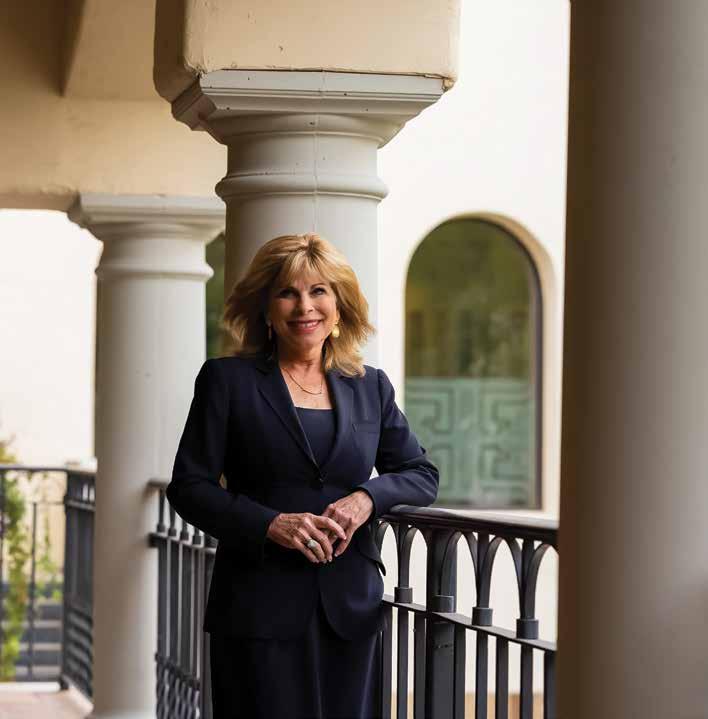






Congratulations to Kevin Kauffman, Freddie Mac’s Vice President of Client Engagement, Single-Family Division, for being honored as one of HousingWire’s 2022 Tech Trendsetters.

Kevin’s leadership is focused on driving innovation and modernization for mortgage clients. His dedication to the end-to-end client experience helps us seamlessly connect client business needs with our technology and data solutions — contributing to our mission of Making Home Possible.
Visit sf.freddiemac.com

VICE PRESIDENT OF REAL ESTATE MARK ADAMS EDITORIAL DIRECTOR TRACEY VELT DIRECTOR OF RANKINGS PROGRAMS LIZ SMITH TECHNICAL DIRECTOR KEERI TRAMM
EDITOR CHRIS CLOW
CEO CLAYTON COLLINS COO DIEGO SANCHEZ
DIRECTOR OF FINANCE ANDREW KEY
DIRECTOR OF PEOPLE AND CULTURE AMY BEARD CHIEF OF STAFF ALEX BRIDGEMAN
VICE PRESIDENT OF GROWTH CAREN KARRIS GROWTH MARKETING MANAGER GREG ROBERTS
SENIOR GRAPHIC DESIGNER EMILY CARPENTER GRAPHIC DESIGNER BRANDON JOHNSON VICE PRESIDENT OF PRODUCT HOLDEN PAGE UX/UI MANAGER BO FRIZE
WEB DIRECTOR BRENT DRIGGERS AD OPS COORDINATOR ELIZABETH LEDOUX
DIRECTOR OF HW+ & EVENTS BRENA NATH
SENIOR WEBINAR & EVENTS MANAGER ALLISON LAFORGIA MARKETING PROGRAM MANAGER LESLEY COLLINS
MEMBERSHIP COORDINATOR SARAHI DE LA CUESTA
PEOPLE OPERATIONS MANAGER JAMIE BRIDGES
AD OPERATIONS MANAGER MATTHEW STAFFORD
MEMBERSHIP DEVELOPMENT SPECIALIST CAROLINE ABAD
EMAIL MARKETING SPECIALIST ALI MORRISSEY GROWTH COORDINATOR SYDNEY SMITH
SENIOR EVENTS MANAGER KATIE GALBRAITH
EVENT SPECIALIST MAKENNA CLAY BUSINESS ANALYST WHITNI ROWE
SOCIAL MEDIA STRATEGIST KENNEDY BENJAMIN
SVP SALES AND OPERATIONS JENNIFER WATSON LAWS VP SALES MICHAEL ORME WESTERN CHRISTI HUMPHRIES, LINDSLEY HARRIS, CASS HECKEL
CENTRAL & NORTHEAST SAMANTHA STEIN
CLIENT STRATEGY MANAGER ADINA RITTER STRATEGIC ACCOUNT MANAGER BRIA SOYELE SALES MARKETING MANAGER TOD MOHNEY
MANAGING EDITOR MALEESA SMITH
CONTENT EDITOR JESSICA DAVIS
MAGAZINE EDITOR AUDREY LEE ASSOCIATE EDITOR MARNI DAVIMES MULTIMEDIA PROJECT MANAGER DALTON JOHNSON
JUNIOR DIGITAL PRODUCER ELISSA BRANCH CONTENT SOLUTIONS COORDINATOR EUNICE GARCIA
LETTERS TO THE EDITOR EDITOR@HOUSINGWIRE.COM TIPS AND STORIES EDITORIAL@HOUSINGWIRE.COM CURRENT MEMBERSHIP / SUBSCRIPTION HWPLUSMEMBER@HOUSINGWIRE.COM NEW

I always get nostalgic looking back on the key moments that defined the year. 2022 was a unique one, as much of the year served as a transition. We were coming off a housing market like nothing we have ever seen before — with the years prior establishing record-setting origination volume. There was so much business to go around. That simply wasn’t the case in 2022. A few months into the year, HousingWire Lead Analyst Logan Mohtashami dubbed the housing market as ‘savagely unhealthy.’ As we head into 2023, that market narrative hasn’t changed much; instead, it’s gotten worse. Now, my goal isn’t to make it seem like everything is doom and gloom. Instead, I want to showcase how this is sue, which focuses on the future of housing, tries to explain what the next year will look like and what it will take for the market to change.
AT THE END OF EACH YEAR
On page 50, our newsroom presents a story of key verticals in the future of the housing market and outlines what you can expect moving into 2023. This annual feature helps put into perspective the forecasts for all things housing. And lastly, I want to say Happy New Year and thank you to everyone who has been following along with us this year. We’re excited to walk into 2023 with you.
Brena Nath Director of HW+ & Events @BrenaNath by @JamesKleimann
by @JamesKleimann
The information contained within should not be construed as a recommendation for any course of action regarding legal, financial or accounting matters. All written materials are disseminated with the understanding that the publisher is not engaged in rendering legal advice or other professional services. HW Media does not guarantee the accuracy of information provided, and is not liable for any damages, losses or other detriment that may result from the use of these materials.
© 2022 by HW Media, LLC • All rights reserved

always driven to bring you what’s next. UWM helps brokers with new products designed to save time and money while offering greater efficiency and control.
UCLOSE 3.0 tranform the way you close In-person, hybrid and virtual closing options.
























TRAC (Title Review and Closing) an industry first for the title process
A cheaper, more efficient alternative to the traditional lender title review process.








SAFE CHECK move ahead with certainty Check eligibility for an appraisal waiver with a soft credit check and delay credit trigger leads.


























































12
Fannie Mae appoints new CEO with experience at major banks like JPMorgan Chase.
Take 5 13
Tammy Richards reveals her three most used tech tools that make the home buying process easier.
Trade Desk 64
Get the latest news from AIME, MBA, NAHB, NAR and NAMMBA all in one place.
Mortgage 68
Event Calendar 14
NAHB and MBA both select warm destinations for their winter season conferences in California and Nevada.
Mergers and acquisitions may be the name of the game during a market slow down.
Title 76
Leaders at the ALTA One conference agree: wire fraud is threatening the se curity of the title industry. Kudos 80
Thousands of dollars were raised for the American Red Cross at the Heroes Golf Classic in Georgia.
Real Estate 72
Local Intel 16
The market slowdown has hit areas across the coun try, from Reno, Nevada, to Destin, Florida.
The average number of days on the market for a home has risen to 19, but is it enough?
HousingWire Annual was a smash hit and we can’t wait to see everyone again next year.
HousingWire is proud to honor these 75 tech trendsetters for their work in advancing technology in the housing industry. From digital closings to internal streamling platforms, these executives have streamlined the process of buying and selling homes.

Ann McGarry
Mary Ann McGarry is the president and CEO of Guild Mortgage. In October, HousingWire was honored to include her in the HW Annual Women of Influence Forum where she discussed work-life balance and the challenges of being a woman in the industry.

2023 is sure to be an interesting year for all sides of the housing industry. After massive refi volume in 2021 and the sky-high home prices of 2022, it seems a slow-down is inevitable for the future. In this feature, three separate articles explore what’s next for mortgage and real estate.
By Barry Coffin By Brian Montgomery and Keith BeckerWhat does the future hold for the housing industry?




Priscilla Almodovar will take the helm of the mortgage finance behemoth, Fannie Mae, on Dec. 5. Almodovar, a former managing director at JPMorgan Chase who co-led its real estate division for five years, has served as CEO of Enterprise Community Partners since 2019. As CEO of Fannie Mae, Almodo var will commit to ensuring that equitable, affordable housing is available to people in communities across the country.

Matt Rocco was sworn in as chairman of the Mortgage Bankers Association (MBA). As chairman of the MBA, Rocco will focus on strengthening MBA’s affordable housing initiatives and identifying key solutions that will help communities across the country to have access to equitable housing. Rocco currently sits on MBA's Commercial Real Estate Finance Board of Governors and is a member of the Urban Land Institute, National Multifamily Housing Council and Pension Real Estate Association.

Polly announced the addition of Jonathan Corr to its board of directors. Corr concluded his 18-year tenure with Ellie Mae as president and CEO. During this time, he took the company private with Thoma Bravo, LLC at a valuation of approximately $3.7 billion before overseeing the sale of Ellie Mae to Intercontinental Ex change, Inc. for $11 billion. He also held several other leadership roles within the company, including senior vice president of product management and executive vice president.
San Antonio-based SWBC Mortgage, a subsidiary of the financial services firm of the same name, ap pointed Jim Collier as chief risk officer. Collier was most recently chief operating officer at Ruoff Mortgage. Collier’s major focus will be on technology. He will be responsible for enhancements aimed at scalability and greater efficiency, as well as automation improvements to benefit clients and employees at SWBC Mortgage.

Movement Mortgage hired Sarah Middleton as its chief growth officer. In this role, she will focus on devel oping sales leadership teams across the country. Middleton came to Movement after serving as president of sales development and recruiting at Fairway Independent Mortgage, as well as CEO of the Fairway Ignite coaching platform. Prior to working at Fairway, she served in leadership positions at Guild Mortgage and Liberty Financial.



NewFed Mortgage hired Jim Janczy as its new executive vice president and chief production officer. Janczy comes to NewFed Mortgage with more than 25 years of experience, starting as a loan officer and working as an executive at Wells Fargo, Envoy Mortgage, Impac Mortgage and Home Point Financial. Janczy will be responsible for growing and managing NewFed Mortgage’s branch network, financial management, customer care and developing the company’s business plans.
Cenlar FSB hired Gary Gaskin as vice president of transfer services. The executive brings more than 22 years of experience in servicing. He was most recently senior vice president of loan servicing at Atlantic Bay Mortgage Group. His career in servicing includes positions like director of loan servicing at Republic Bank & Trust and vice president of loan administration at Specialized Loan Servicing. Gaskin will be responsible for areas of loan boarding, acquisitions and transfers as well as improving operational efficiencies.

As CEO at LendArch, Tammy Richard’s goal is to automate the mortgage process end to end, make the home buying process easier and more accessible for all and reduce the wealth gap through homeownership. A 37-year career veteran, Richards remains at the forefront of automa tion and digitization. She customized one of the first automated processing systems, Mortracs, and is developing several systems to increase the accessibility of homeownership. Richards was recently honored as a 2022 HousingWire Vanguard winner.
Below, Richards answers five questions that give an inside look at her life:
1. My most useful tech tools are... Candor Underwriting Systems, FormFree Passport and Clear Capital.
2. The weirdest job I ever had was... a manual floodplain reviewer
3. My biggest learning opportunity was... When Susan Faulkner, head of mortgage for Bank of America, taught me that it is OK to make mistakes. She was involved in the decision to add a service fee to ATM charges that eventually had to be unwound.

4. If I had picked a different career path I would be an... accountant, I love numbers.
5. I feel like a success at my job when... I see those that work with me achieve their goals.
January 23-26
Cost to attend: Members $1,149 | Non-members $2,879
Presented by CORONADO, CA
THIS EVENT, designed exclusively for independent mortgage bankers, will help leaders build business relationships and focus on the relevant issues in the marketplace. Independent mortgage banks of all sizes will be present for this event, so whether you are just starting out in the field or you’re a seasoned industry veteran, there will be things to learn and connections to be made. Get a rundown on the latest technology available, hear updates on federal regula tions and discover the data you’ll need to improve your bottom line in these uncertain times. Hear from speakers who are leaders in the industry, like MBA’s Michael Fratantoni and Morgan Stanley’s Carla Harris.
January 26-February 2
Cost to attend: Members $600 | Non-members $825
Presented by LAS VEGAS, NVTHE INTERNATIONAL BUILDERS SHOW is back, in person, for all homebuilding professionals to see the newest innovations and products, learn from fellow professionals at workshops and demos and network all week long. There will be dozens of exhibitors at the show, ranging from lighting to windows, fireplaces and other technology. The 2023 New American Home show home will display some of the most innovative and energy-efficient building practices for all attendees. Finishing touches on the show home are set to be completed by mid-December, just in time for the show. After a tour of the show home, attendees will have dozens of sessions to choose from. Check out the educational sessions, opening ceremonies or master workshops.
This episode of the RealTrending podcast features Tracey Velt speaking with Stefan Peterson, the co-founder and chief data officer of zavvie. zavvie is a white-label marketplace solution that connects broker agents and their clients with verified buyers offering new ways to buy and sell homes.

Peterson discusses a recent study on the future of the modern marketplace, including iBuyers, power buyers, listings concierge and homeownership accel erators.
Tracey Velt: I noticed that the average power buyer purchase prices are projected to be down, according to a zavvie report. Talk to me a little bit about purchase price.
Stefan Peterson: The power buyer purchase price reduction is super interesting. A basic fact about power buyer transactions is that prices are quite a lot higher than the overall market. Why is that happening?
It’s a little bit of a mystery. I’d put it down to choppiness in the world market. It will be interesting to see where that shakes out, but I think the relevant fact for real estate professionals is that power buyers are a great solution for higher-price buyers.
TV: Power buyer offer acceptance has remained fairly stable. What are you seeing? Do you have a future look for that?
SP: Yeah, we track the offer acceptance for con sumers who receive an offer from any power buyer our company works with.
Those acceptance rates have remained very stable over the past couple of years — about 30% to 40%. I want to contrast that with the iBuyer model, for example, where it’s more of a 3% to 6% conversion rate.
Scan the code to listen now!
“We were created for relationship, to be around each other. Conferences are the perfect way to connect, grow and help lead. Plus, there’s typcially good food!”
- Dalila Ramos, founder of Taco Tuesday TalksBecause Real-Time Payments is more than just payments. It’s real-time productivity, real-time profits and real-time progress. Talk to us to get end-to-end guidance for your enterprise. Discover more at usbank.com/RTP

Affordable housing prices combined with a vibrant history and a thriving cu linary scene have certainly made Der by City a popular destination for homebuyers. However, even Louisville’s active housing market has slowed down recently. “I haven’t been see ing as many multiple offer situations lately,” Christine Ridenour Lindsey, a local agent with RE/MAX Properties East, said. “Last year you might have 20 offers on a house and half of them would be cash.” According to Ridenour Lindsey, as the market has cooled, she has noticed fewer all-cash offers being made. This trend has made it easier for buyers with financing and other con tingencies to purchase a home. Also helping buyers is an increase in housing inventory, Ridenour Lindsey said. “It is hard to tell if more homes are be ing listed or if things are just sitting a bit longer, but there is definitely more inventory,” she said. “Interest rates going up has slowed the market down a little bit, which we needed — it was un sustainable the way it was going.”


Known as “The Biggest Little City in the World,” Reno, Nevada, has been a hub for everything from railway ex pansion to gambling to divorce settlements. The city was named after Civil War Union Major General Jesse L. Reno, who was killed in action during the Battle of South Mountain at nearby Fox’s Gap. It has become a major technology center as it is home to offices for Amazon, Tesla, Panasonic, Microsoft, Apple and Google. Accom panying the influx of tech companies has been an influx of tech workers, causing home prices in the metro area to rise rapidly. “We have seen tremendous growth,” Mike Wood, a local RE/MAX agent, said. “Since May of 2020 we have seen growth accelerating faster than the national average and this happened as well from 2003 to 2007, but then our decline was also accelerated. It is like a roller coaster: the steeper the climb, the faster the drop.” According to Wood, this latest market shift is no exception to the rule. “I would say our price decrease should probably rank within the 10 highest in the nation, percentage-wise,” he said. “And our buyers that do get under contract are a little bit more skittish and quicker to cancel, so I have seen a high number of back-on-markets.” Looking ahead, Wood said making sure homes are well staged and presented and priced fairly will be key to getting to the closing table.


In November 2021, the median home sales price in Destin soared to $650,000, a year-over-year increase of 28.1%, according to Redfin. Since then, prices have cooled considerably, dropping to a median of $605,000 in August 2022, just 1.0% higher than a year ago. But with beautiful beaches and great amenities, it appears that Des tin’s popularity is here to stay. Family circumstances forced Destin, Florida-based Corcoran Group agent and leader of The Ketchersid Team Jodi Ketchersid to take a step back from her real estate career in May. When she returned to the industry in late summer, the housing market looked different. A lot different. “It was like, ‘Holy cow! What happened to the market?’” Ketchersid said. “It felt like it happened overnight, but it wasn’t like the light shut off. I think this area was being really undervalued for so long — prices were low — and then everything went crazy and house prices became almost hyperinflated as people were willing to pay well over list price.”
Boise, Idaho, made quite a few headlines over the past few years as homebuyers flocked to the state’s capital city. In June 2022, the Boise housing market was the most over priced in the U.S., according to an analysis of 100 markets conducted by researchers at Florida Atlantic University and Florida In ternational University. The study found that property prices in the Boise metro area were 69% higher than they should have been given Boise’s long-term pricing pattern. But the rapidly appreciating home prices and rising mortgage rates have taken a toll on buyers’ purchase power, causing listings to sit on the market longer. “Houses aren’t flying off the shelf like they were last year with multiple offers,” Christina Ward, a local Keller Williams agent, said. Ward said this slowdown has led to an increase in housing inventory. In September, she said the metro area had about double the number of houses for sale as it did a year prior. “We have about 2.6 months of inventory and that is still a seller’s mar ket.” Ward also noted that she is seeing fewer out-of-town buyers. “The buyers we are seeing need to move because they have to — they got a divorce or have an addition to the family, or a new job or are empty nesters wanting to downsize.”

Like so many other markets across the country, rising mortgage rates have taken a toll on the San Diego housing market. According to the San Diego Association of Realtors, the median price of a single-family home in the county dropped 5% in August to $910,000. While still pricy compared to the national median sales price of $389,500, according to the National Association of Realtors, it is a significant decrease. “I have a lot of buyers that are popping back up out of the woodwork,” Alanna Strei, a local eXp Realty agent, said. “They don’t like the interest rates, but it is not stopping them, they just aren’t happy about it.” Despite the slowdown, Strei said home price growth year over year was still at about 15% in Sep tember. “The fact that we are considering that as slow is kind of insane,” she said. “It is still a great time to sell.”

The refi boom is in our rearview mirrors and the road ahead looks promising for home equity volume. Who knows how high that volume could go, considering tappable equity is at a historic high of $11 trillion and total home equity at a record $27.8 trillion.
Black Knight’s report of a $1.2 trillion spike in tappable home equity in the first quarter of 2022 was a stunner, especially as it topped off a 12-month period that saw a 34% collective gain among mortgage holders. The math works out to about $207,000 per borrower and represents a sizable opportunity for lenders.
Of course, a lot of lenders pulled back on home equity products and services when refinancing activity surged and moved the bulk of resources to the more profitable first mortgage space. As these lenders and others now look to re-energize their home equity efforts, and new players make their foray into home equity, reliable title and settlement service partners with deep home equity experience are in demand.
Lenders need support in streamlining their processes and creating an exceptional borrower experience while keeping costs as low as possible.
How do you identify the right home equity partner?
First, think about your organization’s priorities and what kind of support you need. Are you just getting into home equity or are you looking to scale? Are you closing as quickly as you’d like? Are you meeting or exceeding customer expectations for speed, transparency and ease? Is your home equity business as profitable as it could be? Once you’ve answered those questions, consider the following factors and how your home equity service partner should deliver on each one.
The title and settlement processes should never hold you back from meeting your home equity application-to-close goals. Your service partner should provide the support that helps you shrink transaction turn times, whether you are working toward bringing your average close from 35 days down to 10, or from 10 days down to three or even five.
They can do this by applying advanced technology — digital title solutions, automated inspection and appraisal tools, consumerfacing scheduling apps and eClosing solutions — and working with you to optimize your internal workflows and processes.
Technology solutions can vary widely from one provider to another. Learn what products each provider offers before committing to a partnership. Their title and closing products should help you simplify your processes and reduce your application-to-close time frames. They should also focus on understanding your risk guidelines so they can recommend only the most appropriate technology solutions.
Technology can support the following areas with greater efficiency, transparency, accuracy and speed and elevate the customer experience:
• Digital scheduling — Allowing borrowers to schedule their appraisals and closings on their own mobile devices doesn’t just eliminate the back-and-forth calls that have traditionally slowed scheduling down, it makes them feel engaged and empowered. In a recent survey, 83% of consumers said they would be at least somewhat likely to self-schedule their closing appointment, given that option. That’s not surprising, considering they can receive confirmation of their appointment in minutes rather than days.
• eClosings — When the COVID-19 pandemic hit, interest in virtual closings soared. Technology took a giant step forward as emerging solutions became more mainstream.
Today, lenders have choices ranging from in-person electronic notarization (IPEN), remote online notarization (RON) and remote ink-signed notarization (RIN) to hybrid signing and notarization.
• Title solutions — Clear-to-close solutions are now infused with technology from giving title data at the point of sale to property reports, ALTA products and more. Technology has made title a whole new game.
• Automated inspections and valuations — Technology is improving valuation methods and workflows to make appraisals faster. In addition to traditional in-house inspections, your service partner may offer automated valuation models (AVMs), desktop appraisals, hybrid valuations and self-inspection tools.
Before entrusting any partner with your sensitive customer and company data, thoroughly research the safeguards they have in place to protect that data from cyber threats, transfer errors, human error and other risks. Bank-level security should be standard across every facet of the technology that is used to exchange, process and store data.
You might think that in an industry like ours, where customer data is ubiquitous, every service provider would offer the highest level of security. Not so. While all companies are required to put certain measures into place to remain compliant, many smaller companies simply can’t afford to make the necessary additional investments to bring their security up to bank-grade. This isn’t an area for compromise. The stakes are much too high.
Skill and experience are required across every process your service partner provides, from title to valuations to closing. You should be assigned a dedicated service team whose members know the ropes and understand your specific expectations and workflows for home equity transactions. They will keep things moving forward smoothly, competently managing any issues that arise along the way.
For example, what happens if there’s a glitch with the title? Perhaps a lien on the property needs to be cleared before the title can be issued.
Your team should include curative specialists who can clear that file quickly and accurately,
to keep the process moving and get the loan closed as soon as possible. You also need to have a great customer service team, since you will be relying on them to contact customers as needed and keep you in the loop with matters that require your awareness or attention.
Assess agility in a couple of places. If you plan to scale your home equity services with growing market demand, your service provider should be agile enough to not only equip you with the right technology for expanding quickly and smoothly, but also be ready to scale their team right along with you.
Staying on top of the growing volume of orders may require more staff members dedicated to your business, so ask about capacity early in the game. Whether this means moving people within their organization — a larger service provider will have more in-house talent available — or hiring additional team members, your partners should enable you to continue closing more loans, faster.
Second, your partner should be agile in their response to evolving regulations and market needs. The pandemic put this need for agility into sharp focus, as lenders who were able to adapt their technologies and processes quickly to overcome the various challenges presented by health protocols continued to thrive.
Whether you are operating regionally or nationally, your title and settlement service partner should be able to cover your needs wherever you do business. A 50-state footprint is ideal since it affords you the freedom to expand without having to worry about getting additional service providers up to speed on your processes and workflows. A partner with knowledgeable people who stay up to date with every state’s regulations and nuances is worth its weight in gold, especially as those rules keep changing.
Look for a service partner that offers a unique combination of cutting-edge technology and industry tenure. Companies that have been around for decades have a deep understanding of market shifts, as well as consumer and lender needs. Their staff is likely to have more experience, from the line level through upper management. Take a look at their track record of supporting lenders through cycle after cycle after cycle. Ask for references.
Doing business successfully in the home equity space requires a strong partnership. As the home equity boom continues to gain steam, home equity service providers who can deliver in each of these areas will help lenders thrive.
Coffin is the managing director of originations title and close at ServiceLink.

There has been a flurry of recent articles forecasting a decrease to Federal Housing Administration (FHA) insurance premiums. Several trade groups, including the Mortgage Bankers Association, have corresponded with the HUD Secretary in support of a cut to both the up-front and annual premiums, and some have advocated for eliminating the “life of loan” structure. One news article suggested a possible presidential announcement of FHA premium reductions prior to the November elections.
A similar announcement was made by former HUD Secretary Andrew Cuomo a week before the 2000 presidential election, when FHA lowered the upfront premium and reduced the life of loan premium once a borrower reached 22% equity in the home. While it is doubtful FHA premium cuts are on voters' minds today any more than they were in 2000, administrations frequently time what they view as positive news around election cycles.
Before reducing FHA’s expected receipts and thereby decreasing its claims-paying capacity, the FHA should continue to address a persistent phenomenon that is not garnering many headlines but is a lingering economic effect of the COVID-19 pandemic. Approximately 345,000 homeowners remain on COVID-driven forbearance plans with their mortgage servicers. At least 137,000 of those borrowers have FHAinsured loans. Another 225,000 FHA borrowers are seriously delinquent and have not sought
forbearance or loss mitigation assistance, and 156,000 borrowers who exited forbearance have now become delinquent again. Those numbers are not outsized by FHA standards and have come way down from pandemic highs. Nevertheless, we are in uncertain economic times: Inflation grinds on, interest rates are skyrocketing and according to many experts a national recession looms. The housing purchase and refinance market has slowed materially, and home prices are dropping in almost every major metropolitan area although many are still above pre-COVID levels.
If things turn tougher, FHA borrowers who are still in forbearance, along with those borrowers who have been unsuccessful in completing a COVID loan modification or returned to delinquency will more than likely need further support. So could more recent borrowers as we have observed an increase in FHA early payment defaults over the past year. If so, FHA’s Mutual Mortgage Insurance Fund (MMI Fund) would be tapped.
The MMI fund is there for exactly that purpose, to be the primary buffer against inevitable shifts in housing and the economy. It is a cornerstone of the countercyclical role FHA plays when lending in private markets becomes constrained or, more recently, a global pandemic negatively impacts the economy and by extension leads to massive job losses.
However, it is also vitally important to understand the sensitivity of the MMI fund to macroeconomic outcomes and the assumptions built into the forecasting models that have been proven to change dramatically, most notably, Home Price Appreciation (HPA).
As it stands now, according to estimates by CoreLogic, year over year HPA is expected to fall from the 20% reached in
“We are in uncertain economic times: inflation grinds on, interest rates are skyrocketing and according to many experts a national recession looms.”
February to 3% in 2023. While it’s difficult to place an exact number on such a move’s impact to the MMI Fund’s Capital Ratio given other macroeconomic factors, that 17% decline will likely translate into a large shift in the net present value of expected losses to the MMI Fund.
To illustrate the speed at which underlying assumptions can change, consider a similar 17% decline during the period between 2006 to 2009, highlighted in FHA’s FY2021 annual report, when HPA dropped from roughly 32% in 2007 to 15% in 2009, while the capital ratio dropped 7%. In the period just before and after the “Great Recession,” the MMI Fund’s capital ratio stood at 7.4% in FY2007. By 2008, the capital ratio had dropped to 3.2%, and by 2009 .4%. By 2012, FHA’s capital ratio had cratered into negative territory, -1.4%, requiring a $1.7 billion draw on the U.S. Treasury in 2013.
If the decision around premiums drags past the 2022 election, soon after FHA will release the results of its annual review of the FY2022 Mutual Mortgage Insurance Fund. To be clear, we expect the annual review, which looks back at FY2022, to show an improved capital ratio — rising above the more than 8% ratio achieved in FY2021 — but it will reflect a better economic foundation than what is anticipated to occur in FY2023 as two primary components of the capital ratio are forecasted interest rates and HPA. In actuality, these components are expected to be worse than forecasted.
Indeed, if the recent quarterly report to Congress is any indication, which showed a positive economic value in the MMI Fund of $138 billion, the pressure will only mount for a premium decrease and also for eliminating the so-called “life of loan” premium (something the White House Office of Management and Budget has historically opposed).
But if the economy faulters even more, we might see FHA’s expected receipts fall for other reasons. What’s more, FHA forward endorsement volume through Q3 FY2022 was 766,173 — a 29% drop from 1,081,751 through Q3 FY2021, and a 40% decline if you compare Q3 2022 to Q3 FY2021. A drop this significant will more than likely disrupt previous model projections for cash receipts to FHA from borrower premiums.
While Fannie Mae and Freddie Mac buy delinquent loans out of securities pools at their existing interest rate, FHA must later adjust the interest rate on the modified loan to the current market rate which today has inched over 7%.
The economics of a delinquent loan with a 3.5% coupon rate simply do not work when the modified loan has a rate of 7%. The authors have also suggested utilizing Homeowner Assistance Funds (HAF) or partial claims to buy down interest rates on loan modifications but that will require significant collaboration with mortgage servicers, HUD, Treasury and the state housing agencies administering the program on behalf of their citizens.
We believe now is exactly the time to stay committed to tens of thousands of existing borrowers who remain most in need — and to those who may soon find themselves in more difficult financial circumstances. FHA has to explore new ways of modifying loans and helping borrowers struggling to comply with recently modified loan terms and account for the costs in doing so as part of their consideration for reducing premiums assessed to new or existing borrowers. In truth, holding off any cuts to premiums would be a decision to preserve the capital needed to help thousands of families stay in their homes. That assistance is more important than ever today, as both housing affordability and availability remain scarce nationwide.
Keeping the focus on home borrowers who are most in need is in keeping with the agency’s longstanding responsibility to communities. In real terms, FHA uses of income generated from mortgage insurance premiums to help perpetuate the stabilizing force of U.S. homeownership, particularly in challenging economic environments.
We are not calling for doom and gloom. And we want FHA to serve its mission of helping low- to moderate-income families and individuals get into homes in a sustainable way, as efficiently as possible, to fully participate in American life.
FHA should carefully prioritize borrowers who are most in need, like those at risk of losing their homes or even homelessness from suffering.
 By Lesley Collins
By Lesley Collins

While 2022 has been a challenging year for housing, one thing we have learned is that periods of crisis can also be the driv ing force behind innovation and progress. This year’s 2022 HousingWire Tech Trendsetters have a long list of achieve ments that are driving the industry’s digital transformation. These tech execs aren’t just streamlining mundane practic es, they are helping to tackle major, industry-wide issues like housing equality, racial bias and finding ways to help under served markets to build wealth through homeownership.
Among these leaders are those like HouseCanary CEO Jeremy Sicklick, who has also become a thought leader in the resi dential real estate space where he discusses racial bias in real estate evaluations. Under his leadership, HouseCanary has shared suggested requirements to replace traditional home evaluations with an automated model in an attempt to com pletely eliminate racial bias in home valuations.
Another winner, Sarah Walker, chief product officer at Ribbon, is passionate about mentoring female engineers and is a found ing member of Chief, a private network focused on connecting and supporting women leaders. Through this group, Walker helps mentor and coach the next generation of women leaders and be part of the extensive network of executive women made available to help them grow their careers.
Kade Clark, senior vice president of digital valuation products and sales at homegenius, has been an outspoken supporter of using technology to help reduce bias in the valuation pro cess by embedding advanced computer vision technology into digital valuation products, which helps to assess a property’s condition while limiting human bias.
The following list includes 75 shining examples of tech ad vancements and industry progress that will forever change the housing economy. Congratulations to the 2022 HousingWire Tech Trendsetters.


Mike Abner is the chief technology officer at HomeLight. He was the company’s first hire in the engineering department, and he scaled the engineering team to a global organization. For over nine years, Abner has been the driving force behind bringing each of HomeLight’s products online.




Abner believes in HomeLight’s mission to keep the agent at the center of each experience. The products Abner and his team design are aimed to provide a user-friendly experience that propels agents’ businesses forward, rather than cutting them out completely or creat ing unnecessary hurdles. Abner leads innovation in the homebuying and selling processes, not only helping buyers and sellers achieve the ultimate goal of homeownership, but also empowering top real estate agents all over the country to compete and win.
Abner continues to challenge his peers to utilize technology to create a more simple, certain and satisfying real estate transaction for all.
As the CEO and founder, Michael Alladawi drives Revive’s mission to guide home sellers through presale renovations without upfront costs.
After watching friends and family struggle with home remodeling projects, Alladawi realized the home renovation industry was ripe to be revolutionized on the consumer side. Based on his experience in both flipping houses and new construction, Alladawi began Revive with the mission of changing the way homes are sold and creating a win for homeowners, contractors, agents and brokers. With Alladawi at the helm, Revive also launched a new mobile app called Revive Home, designed to reduce stress by connecting homeowners, agents and renovation teams. The app makes it simple for agents, home owners and contractors to monitor renovation project updates by centralizing communication with all parties from the convenience of their phones. Through all these innovations, Alladawi’s aim is to make generational wealth through homeownership accessible to all.
Grier Allen, BoomTown CEO, president and co-founder, has long been considered an innovator in the housing industry. His leadership and vision over the past few years have created solutions for long-stand ing industry problems, fueled the success of real estate businesses nationwide and helped clients navigate shifting markets and turn challenges into opportunities. Allen’s moves have been bold — acqui sitions, key hires, brand new products — and the wins have been big.
With Allen at the helm, BoomTown’s momentum over the past year and a half includes strategic acquisitions like Brokermint, a back office software, integral new hires and the recently expanded Success Assurance Program. Success Assurance is a concierge service that responds to and nurtures new leads on behalf of their clients. Thanks to the program’s expansion, it can now monitor an agent’s entire database for meaningful behavior, and proactively reach out on their behalf to create more opportunities and drive conversions even in uncertain markets.
Jeff Allen, president of CubiCasa, leads the company’s overall strat egy to digitize property data collection and unlock actionable data insights for homeowners and mortgage professionals through techno logically advanced solutions. Under Allen’s leadership, the company has experienced tremendous growth. The CubiCasa app is used in more than 170 different countries to create over one million floor plans to date.
Allen came across CubiCasa’s innovative technology while working as Clear Capital’s executive vice president of innovation labs. He was so impressed by the easy-to-use technology that the firm became a CubiCasa customer before they went on to buy the proptech company outright in September 2021. Since then, Allen has led CubiCasa to be the global market leader in fast and easy-to-use mobile, indoor scanning apps. From conducting a simple walk-through of a home, the technology produces a precise floor plan sketch with the option to calculate GLA aligned with ANSI standards.
Jeff Allen President CubiCasa CEO, President and Co-founder BoomTownAustin Allison, CEO and co-founder of Pacaso, is obsessed with efficiency and out-of-the-box thinking. In October 2020 he founded Pacaso and within six months it became the fastest company to ever reach unicorn status in the U.S. Pacaso’s category-creating co-ownership model empowers a new, more diverse and inclusionary sphere of second home buyers to own a share of a second home and experience true real estate ownership. Pacaso now operates in more than 40 top second-home destinations across the U.S. and Europe. In 2021 Allison led Pacaso to sell nearly 400 units and drove nearly $300 million in revenue. In the first six months of 2022, Pacaso generated more revenue than all of 2021.
Pacaso’s biggest impact in the real estate industry was proving that an alternative isn’t just viable, but in high demand. Leading brokerages are embracing co-ownership as a result. Thanks to Allison, Real Estate Standards Organization (RESO) now defines “co-ownership” as a property type.
Mahnaz Anwar is the product manager for the Black Knight Loansifter product, a pricing and eligibility engine. The product is the industry’s most widely used all-in-one mortgage broker solution for pricing scenarios that offer brokers access to the industry’s largest network of wholesale investors and thousands of home financing products in just seconds. Anwar has helped develop a dynamic search criteria form to retrieve product and pricing results that provide brokers with a significant competitive advantage. Her direction on Loansifter’s innovative design helps mortgage brokers execute the most profitable lending strategies to build relationships and grow their businesses. Anwar is data-focused and driven to provide the innovation that customers need for increased success. The Loansifter management tools she defined lead to the development of a highly configurable toolkit that brokers can use to customize search defaults, accom modate investor-specific pricing incentives and quickly access in vestor-specific fee information to further streamline productivity.




Jay Arneja, vice president of closing solutions at SimpleNexus, has spent her 25-year career in the mortgage industry. Arneja has redesigned the mortgage closing and post-closing processes. At SimpleNexus, an nCino Company, Arneja leads the development of the organization’s widely used eClosing platform Nexus Closing. She has also shaped electronic closing and post-closing standardization through involvement with MISMO, led product teams at MERSCORP and helped high-profile lenders make improvements to their processes and customer experience as a consultant for Freddie Mac.

Arneja’s entire career has equipped her for digitizing and rede signing the mortgage closing and post-closing processes. Having experienced the pain points of paper-only closing processes firsthand, she saw an opportunity to make a difference at MERSCORP. Today, Arneja is helping to usher in a new age of digital closings that scale back paperwork, get loans to funding faster and emphasize borrower single sign-on convenience.
Glen Banta, chief technology officer at TMS, exhibits a rare combina tion of abilities, as he is both a visionary leader with a plan for the future and a practical pragmatist that remains rooted in the real world. He possesses a true mastery of information technology in addition to superb leadership skills. Banta is the driving force that keeps TMS running smoothly, secure from threat and prepared for the future.
In the open and collaborative environment at TMS, Banta and his teams are included in all aspects of strategic ideation. As a result of this inclusion, Banta can bring his skill set to the forefront and impact the trajectory of the organization. Banta is consistently seeking out solutions designed for other sectors while possessing the rare ability to translate them into viable and effective solutions. With the knowledge of virtually every technology solution available and the skill set to bring them to fruition, Banta is able to enhance the performance of existing systems, while implementing cutting-edge solutions to drive efficiency and improve performance for all stakeholders.
CEO and Co-Founder Pacaso Mahnaz Anwar Product Manager Black Knight Glen Banta Chief Technology Officer TMSMerav Bloch has been at Opendoor for six years and is constantly taking bold bets and pushing the envelope to inspire innovation at the company. Holding a variety of roles, from the head of operations excellence to the head of expansion, she is currently vice president and general manager for Opendoor Exclusives, a product she and her team pioneered and announced this year. A first-of-its-kind online marketplace, Exclusives enables buyers to instantly go into contract on a home at a pre-set price, turning home buying into an e-com merce experience, and making homeownership more accessible.

Bloch and her team launched Opendoor Exclusives to make buying a home certain and more attainable. Through this product, buyers can find, view and purchase homes offered exclusively through Opendoor two weeks before they are listed on the MLS and at a lower price. The price is completely transparent — no negotiations, no love letters to sellers and no potential heartbreak of buyers losing a home they love. Buyers are in control with a fully digital checkout experience.
President of the Boston National Title Agency, Nathan Bossers com


bines a love of collaborative innovation and a focus on improving the entire lending cycle to make a lasting impact on the mortgage banking industry. In addition to introducing the AI-driven instant title decision engine in 2022, he has led the reengineering of the traditional home equity lending process — harnessing technology to help lenders diversify their products while maximizing profits.
Bossers is the authority on common-sense innovation — ideating technological solutions that fill a need, are fairly easy to implement and will be accepted by lenders and borrowers alike. Whenever an Incenter company launches a digital product or service, Bossers offers input behind the scenes. Bossers and his team recently launched Dekko, an instant title decision engine that uses AI and machine learning to make decisions on the cleanliness of titles in seconds and incorporates these decisions into Boston National’s proprietary underwriting guidelines, as well as individual lenders’.
As the founder and CEO of Mynd, Doug Brien aims to make real es tate investing accessible to anyone interested in building long-term, generational wealth. After 12 years in the NFL, Brien turned to real estate for his next chapter. Brien took everything he’d learned as an individual real estate investor, and in 2008, he co-founded Waypoint Homes. It was the first company in the U.S. to purchase and own thou sands of single-family rentals. Brien and his co-founder’s embrace of cloud and mobile computing would allow them to organize a large portfolio of homes and manage them efficiently. Brien eventually grew Waypoint Homes to over $3 billion in assets and 300+ employ ees. He guided the organization through a merger with the company Starwood Properties, and eventually Invitation Homes.

Today, Brien and his team use technology and data science to democ ratize the single-family rental industry. Under Brien’s leadership, Mynd has grown to manage over 11,000 units in over 25 markets, serving the $3.4 trillion dollar single-family rental and build-for-rent sectors.

Brett Brumley, CEO of Lender Toolkit, has built his company’s con tribution to the industry around the idea of seamlessly integrating technology solutions for the housing economy. When he began in lending, he noticed a lack of knowledge surrounding mortgage soft ware and transformed the use of technology across the company. His innovative use of technology is the foundation of Brumley’s passion for driving the mortgage industry into the digital era.
Brumley’s high-tech education led him to share the impact of a more innovative workflow with the executive team, citing increased accuracy and volume. By implementing his methods, he changed their way of doing business for the better. This moment was the spark that ignited the idea for Lender Toolkit. Once Brumley made the discovery for one company, he saw an opportunity to lead a digital mortgage transformation on a much larger scale. Today, Lender Toolkit has a footprint touching billions of dollars a year across hundreds of lenders. Digitizing processes improves overall experience and profitability.
Vice President and General Manager for Opendoor Exclusives Opendoor Founder and CEO Mynd President Boston National Title Agency -Kade Clark is the senior vice president of digital valuation products and sales for homegenius. In the last year, Clark has helped launch a new automated valuation model (AVM) embedded with computer vision AI and enhanced the broker price opinions (BPO) fulfillment process with automation — two achievements that will increase speed, accuracy and coverage for homegenius customers. Clark is also fo cused on supporting DEI in the housing industry and his community. He is a champion for using technology to eliminate bias in valuations as well as an advocate and leader in the LGBTQA+ community.
When it comes to the geniusprice AVM tool, bias is reduced by embedding advanced computer vision technology into digital val uation products, which helps to assess a property’s condition while limiting human bias. Clark’s team tested and produced an upgrade to the tool that uses AI-deep learning, computer vision technology and image recognition to automatically enable condition scoring to inform a property’s value.
Senior
Nick Conteduca, senior vice president of tech innovation at Opteon, leads technology innovation with a mission to bring valuation mod ernization to the appraisal industry. Since 2011, Opteon has revolutionized the appraisal industry in Australia and New Zealand by using proprietary technology to deliver reports in 2 days with a 1% revision rate. Now, Conteduca is responsible for leading the integra tion and development of this technology for the U.S. market in global collaboration.
When he came to Opteon in 2021, he was immediately recognized as a strategic leader with technological insight and savvy. He successfully unified Opteon’s strong team of staff appraisers and equipped them with world-class technology infrastructure. Today, he leads the charge to combat the issue of long turn times and revolutionize the industry. A certified appraiser himself, with 20 years of experience, he made it his mission to transform the appraisal process from antiquated to technological, resulting in fast, accurate, tech-driven appraisals.
Steven Cooley is the founder and CEO of Art Vs. Math, and the creator of Mortgage Advisor Tools which has helped dozens of mortgage lenders find new technology and service providers to improve the overall innovation of the entire mortgage industry. In addition to helping lenders, mortgage technology companies receive convention-level exposure every moment of every day.

As an enterprise-level consultant to lenders and technology com panies, Cooley has been an established thought leader through his writing, product development and strategy work. Cooley specializes in helping new technologies break into the mortgage industry and creating messaging, deploying marketing campaigns and managing advertising to drive awareness of new technology. In addition to his other work, Cooley spends countless hours helping smaller lenders find affordable tech options to meet their needs. Cooley’s passion for this industry and willingness to provide impactful mortgage technology resources have propelled the growth of Art Vs. Math.


Chimney co-founder and CEO Matthew Covi is streamlining the endto-end home equity process with this company’s latest innovation. Under his leadership, Chimney is the first company to offer a platform for homeowners that combines financial data with property data to give actionable advice about their home’s value, home equity, borrowing power and pre-qualified offers.

Under Covi and the founding team’s leadership, Chimney has added more than 60 new financial institution clients in the last year, as more banks, credit unions and lenders invest in digital experiences that are personalized to their customers’ needs. As a result, Chimney’s inter active tools surpassed 20 million user sessions, helping more than 12 million homeowners make informed financial decisions. Given the company’s expanded client roster, more than 2 million consumers are engaging with Chimney’s tools each month. This rapid growth demonstrates increased demands among consumers and homeowners for tools and resources that are personalized to their buying journey.
 Senior Vice President of Digital Valuation Products and Sales homegenius
Founder and CEO Art Vs. Math
Vice President, Tech Innovation Opteon
Senior Vice President of Digital Valuation Products and Sales homegenius
Founder and CEO Art Vs. Math
Vice President, Tech Innovation Opteon



Kori Covrigaru the CEO and co-founder of PlanOmatic has led the charge in bringing 3D virtual tours to the booming single-family rental industry with speed and scale nationwide. Today, Covrigaru’s company is the leader in providing 3D virtual tours to investors, owners and property managers for single-family rental (SFR) properties across the country. The adoption and use of 3D tours to market SFR properties are exploding thanks to Covrigaru’s vision because owners and investors recognize that in a crowded marketplace, a 3D tour can help a home stand out to consumers.
Covrigaru’s company increased its number of 3D virtual tours for SFR properties across the country by 243% between January 1, 2021 and August 11, 2021 and the same time period in 2022. With Covrigaru at the lead, PlanOmatic implemented a V3 Order API and Webhooks technology integration into its platform to allow its SFR clients a seamless and automated solution for ordering 3D virtual tours, property photography and floorplans.

Suhrud Dagli is the co-founder and chief technology and innovation officer of RiskSpan. He leads the organization’s product development and technology services and innovation teams, and he has experience in developing analytical tools to support risk management best prac tices. Dagli led the development of RiskSpan’s analytical framework for prepayment and credit models. Dagli also co-founded RiskSpan’s SmartLink Lab, an initiative aimed at migrating mortgage loans and securities to the blockchain.

Dagli emphasizes helping clients understand and implement innovative new technologies. His dedicated team of quants, data sci entists and programmers play a role in every stage of the company’s technological development. Dagli is also the mastermind behind RiskSpan’s award-winning Edge Platform. As the company’s principal technology leader, he has presided over every iteration and innovation of the Edge Platform whose sole purpose is to create technological efficiencies for mortgage investors.
Greg Crozier is the chief information officer at QC Ally. A 27-year veteran in the tech and IT world, Crozier has centered his career on delivering secure, high-quality, innovative technology solutions that meet the challenges of tomorrow. Crozier leads innovation and strategy on LQ Pro, QC Ally’s QC industry-disrupting software, allowing QC Ally clients the ability to track all their data in one place. Crozier relies on his financial services background to build data centers and innovate platforms for the mortgage audit services space.
Crozier’s leadership and software development has helped grow QC Ally into one of the mortgage industry’s most used and trusted loan quality and audit services platforms. He oversees the end-to-end running, monitoring and building of the company’s network and IT operations and systems. He and his team are constantly developing intuitive technology platforms that improve QC Ally’s client partners’ efficiency and quick turn times to get to closing faster and ensure loan quality and accuracy throughout the entire life cycle of the loan.
Davé Co-founder Chief Technology Officer MaxwellRutul Davé co-founded Maxwell in 2015 with one mission: to empower small to midsize lenders with technology that streamlines the entire mortgage process and allows them to compete against the industry’s largest players. As Maxwell’s chief technology officer, Davé has spent the past year spearheading new solutions to help lenders combat the current market, including Maxwell Capital, Maxwell Processor Edge, Maxwell Private Label Origination and the Maxwell Spanish-language loan application. These solutions help lending teams close 15% more loans per month, with a 10% reduction in loan resubmissions.
Because Maxwell is made up of an integrated workforce of engineers and mortgage professionals, including underwriters and processors, Davé and his team have unique insights into an LOs day-to-day work. Channeling this feedback, Davé led the Maxwell engineers to create efficiency-driving solutions and technology that empower lenders to recoup profitability. Under Davé’s leadership, the Maxwell engineering team built and launched Maxwell Processor Edge.
Co-founder and Chief Technology and Innovation Officer RiskSpan Greg Chief Information Officer QC Ally Rutul andTrey Dirks, the vice president of product and information technology, plays a central role in leading product strategy for First American Title’s agency division and the recent launch of First American Title’s PRISM digital platform. Dirks’ more than 20 years in the real estate, technology and financial services industries have provided him with a deep understanding of industry challenges. His expertise helped develop a cost-effective digital platform, providing tools that increase efficiency, strengthen customer engagement and enhance the real estate transaction experience.
Dirks leads the product strategy of the Agency Division’s customer-facing technology platforms, maintains oversight on integration partnerships as they move through their development cycles and directs go-to-market strategies for their initial launch and ongoing success. In August 2022, Dirks helped launch First American Title’s PRISM platform and helped agents seamlessly offer valuable products and services directly to their customers, online.
Brian Donnellan, the president and CEO of Bright MLS, is providing strategic leadership to the entire MLS industry. Donnellan is devel




well.
Donnellan’s leadership of REdistribute is rewriting the rules of en gagement. REdistribute is paving the way for professional MLS organizations to invest in solutions that create additional value for brokers, while also delivering the most comprehensive, accurate and fresh est data to critical participants in the housing industry. Mortgage lenders, government-sponsored entities and others creating property valuations and insights will benefit greatly from REdistribute. In addi tion to distributing MLS data from the source, REdistribute will also deliver innovations that will allow licensees such as lenders, insurance companies and government-sponsored enterprises to gain real-time insights on a market-by-market basis.
Paul Dorney is the chief technology officer of PunchListUSA, where he is the driving force behind the company’s award-winning technology and products. Dorney and his team are building innovative technolo gies to empower homeowners and real estate professionals to order repairs, renovation services and related products online.
Dorney is currently building platform innovations that include the build-out of proprietary inspection data to create insights, recom mendations and proactive maintenance schedules in addition to the continuous tuning of the company’s no-visit, no-fee estimation tool for real estate professionals and homeowners. Dorney is building a proprietary auto-estimate tool to extract and digitize inspection reports for real estate professionals and homeowners to sort, share and order services from their phones or laptops. Dorney’s team is also working on a dynamic pricing engine that would incorporate real-time local labor market rates from a network of 5,000 tradesmen and women with Home Depot’s product catalog.

Jon Druse, chief technology officer at Percy.Ai, has always been an advocate for doing things the right way instead of the easy way. Druse joined the team at Percy.Ai just last year with previous positions at technology firms including Lone Wolf Technologies and WR Studios. Druse brings a decade of experience building high-performance APIs and robust real estate platforms to Percy. His experience and leader ship will help Percy reach new levels of growth and success.
Today, Druse is leading the charge to further unlock the potential of the Percy platform by building new, faster and more robust systems and algorithms. Druse is commissioning a team to rebuild large parts of the platform from the ground up with an emphasis on speed and reliability and utilizing best-in-class tools. Real estate brokerages generate a wealth of data but struggle to turn it into profit. Druse drives the tech that lets Percy connect the dots to capture all that buyer data, from virtually any source, and effectively use it to attract more sellers and win more listings.
Chief Technology Officer PunchListUSA Brian Donnellan President and CEO Bright MLS oping and guiding a joint venture, REdistribute, which will return the control of data to the brokers who provide it and share revenue directly with them as Chief Technology OfficerSean Faries, CEO at Land Gorilla, has done more than any other individual to change the construction loan process. Land Gorilla is one of the mortgage industry’s leading construction loan management software. Forward-thinking lenders who have adopted Land Gorilla have freed themselves from the historically time-consuming and frus trating inspection and draw disbursement processes to reduce draw times by 80% or more — while doubling and in some cases tripling construction loan volumes.
Faries’ efforts are helping lenders address construction loan chal lenges quickly, safely and cost-effectively, while enabling them to provide the type of financing their customers need. His work provides digital technology that eliminates the historically long, frustrating and error-prone back-and-forth in the construction loan process. Land Gorilla has developed many innovations to its construction loan platform over the years, including digital lien waivers, digital title updates, Doc Builder and OneSite — a simple-to-use mobile app.
Priscilla Flake, vice president of product at Flueid, partners closely with the company’s CEO and leadership team to drive product strat egy and advance customer satisfaction, retention and adoption. Over her career, Flake has been dedicated to innovating the title process. While title products have traditionally been one-dimensional in terms of the data set or the function, Flake has elevated title technology to become a modern, multi-data source decision-making engine for today’s environment.
Since joining Flueid in 2020, Flake has played a critical role in the evolution of Flueid’s core platform product, Flueid Decision. She oversaw the launch of new purpose-built products of the platform for every transaction type and user profile in the real estate life cycle. Under her leadership, Flueid has launched four offerings in 24 months. Flake has also led with innovation, elevating Flueid’s platform beyond title to package title data, decisions and insights into a workflow tool for a variety of user profiles.



Jack Friend is Insellerate’s chief operating officer and chief financial officer. He has consistently demonstrated the ability to create the vision, strategy and consensus-building for a wildly divergent group of mortgage industry stakeholders on complex technical topics. His ability to design and deliver innovative solutions to the mortgage marketplace has impacted thousands of people.

Before Insellerate, Friend served at Feeding America, where he was directly responsible for three national sourcing programs that provide over 240 million pounds annually of products to food banks across the U.S. He applied those experiences to improve the mortgage process through innovative technology solutions. He is responsible for creating sales center technology, utilizing the best practices to capture and convert sales through a robust SAS platform. He devel oped Insellerate’s three-stage system that includes inFlow a real-time sales dashboard reporting, and inTouch, an automated personalized email marketing platform specifically for the mortgage industry.
Jacob Gibbs is the vice president of technology and one of Mortgage Coach’s longest-tenured and most well-respected employees. He has had a hand in nearly every aspect of the company’s technological evo lution over the last 15 years, from designing its support infrastructure to launching its native mobile apps and administering internal technology to leading product development initiatives. After the merger of Sales Boomerang and Mortgage Coach, Gibbs continues to be a driving force behind its market success and continued growth.
Gibbs’ milestone achievements over the years include architecting Mortgage Coach’s support team, launching the Advice Engine plat form and introducing native iOS and Android Mortgage Coach apps. Most notably, Gibbs leads the development of the brand’s award-winning Total Cost Analysis presentations. Gibbs is working tirelessly to u nify the merged organizations’ software development life cycles to create an innovative sales and retention platform that will bring powerful new tools to mortgage lenders.
 CEO Land Gorilla
Jack Friend
Chief Operating Officer and Chief Financial Officer
Insellerate
Vice President of Product, Flueid Decision Derivatives Flueid
CEO Land Gorilla
Jack Friend
Chief Operating Officer and Chief Financial Officer
Insellerate
Vice President of Product, Flueid Decision Derivatives Flueid

Shelli Girard, the vice president of software development at Sagent, makes the fintech future real while adding a steady hand in a rough market cycle. Through Girard’s forthright, collaborative leadership, Sagent delivers experiences that serve not just homeowners, but also lenders, banks, investors, GSEs, regulators and ecosystem partners.
Girard builds and evolves Sagent’s cloud-native, open API platforms that power daily servicing, default management and homeowner care and retention in America’s $12 trillion mortgage servicing market.

Girard is the executive technical lead for several of Sagent’s ser vicing platforms. She has combined her computer-science education with more than 7 years of expertise in the mortgage ops trenches to build industry-changing LOS, decisions and default-management platforms. Her hybrid resume is perfectly suited to meet today’s market priority of rewiring America’s giant mortgage servicing industry for homeowners, banks/lenders, investors, regulators and the fintech ecosystem overall.
Co-founder
Jason Hardy, co-founder and CEO at Ownly, is also an influential thought leader in real estate, marketing and sales.


Through Hardy’s vision, Ownly has simplified the homebuying experience for qualified buyers and sellers. Buyers can build and price their dream home online and get accurate pricing, lot and custom izations through Ownly’s transparent shopping platform. Through Ownly Verified, buyers can also get prequalified and verified in a one-time application, enabling them to shop anywhere, anytime. In addition, buyers can earn valuable rewards for shopping and com pleting purchases online. For sellers, Ownly connects them with the most qualified buyers in their market, saving sellers time and money on pre-qualified customers.
Outside of the platform itself, Hardy continues to focus on partnerships with leading brands, like HomeWise, Honest Door and LoyaltyONE’s AIR MILES, that deepen Ownly’s commitment to pro viding its clients with the best experience.
Christopher Hussain is the CEO of RealKey and has consistently been at the forefront of innovation to re-envision how the housing ecosystem approaches mortgage lending. As a two-time back-to-back top originator in the U.S., and the only person to have originated, processed and underwritten loans in all 50 states, Hussain’s unique experience and focus on automation have helped him stay ahead of the pack. His insights have correctly predicted changes in the industry to avoid speed bumps and maintain momentum on RealKey’s journey to realize his vision of a document-centric approach to lending.
Similar to how Hussain became the top originator in the U.S. for two straight years, he has his hands in everything at the organization, ensuring the highest quality product and creating a culture of excellence reflected in every facet of the business. Thanks to Hussain, RealKey recently won the fintech category for the Extreme Tech Challenge, presenting at Tech Crunch’s Global Climate Summit for their work on driving social impact through innovation and automation.
John Hutchens is the vice president of business intelligence and emerging tech at Finance of America Reverse (FAR). He creates competitive advantages through data and technology and funda mentally changed the way FAR operates.
In his career, Hutchens has built innovative solutions on the originations and servicing side of the mortgage industry, including an inves tor reporting system that still serves as the accounting record at one of the nation’s largest nonbank servicers. Hutchens has introduced technology solutions centering around the end user to elevate their digital experiences and has tied those experiences together with sales engagement and analytics to drive more conversions. He launched the MarTech Stack at FAR, which has created end-to-end digital attribution, streamlined usability testing, decreased lead acquisition costs and allowed FAR to complete scaled inbound and outbound marketing campaigns. He revamped FAR’s SalesTech Stack, providing digital engagement and home-grown B2C digital experiences.
 Christopher Hussain
CEO RealKey
and CEO Ownly
Vice President of Business Intelligence and Emerging Tech Finance of America Reverse
Christopher Hussain
CEO RealKey
and CEO Ownly
Vice President of Business Intelligence and Emerging Tech Finance of America Reverse

Bob Jennings, executive of collateral and risk solutions at CoreLogic, is a natural leader and innovator who builds high-functioning organi zations that execute disruptive industry-level innovation.



Jennings began his 16-year career at IBM Corporation, later Black Knight, then went on to become CEO of ClosingCorp where he and his team revamped vendor and third-party service fee management. They were able to create an integrated suite of ClosingCorp, solutions that allowed their clients to effortlessly automate the allocation of services to providers; obtain guaranteed fee quotes; and order, track and manage the services required to close a real estate transaction with the click of a button. Upon joining CoreLogic, Jennings recognized a unique opportunity to combine the company’s leading valuation workflows and vast data resources with ClosingCorp’s title and closing expertise to lead the industry beyond traditional order management capabilities and help them level up with truly innovative data-enabled workflow solutions.
As single-family vice president of client engagement at Freddie Mac, Kevin Kauffman leads strategy for a seamless end-to-end client and partner experience. He and his team partner directly with industry stakeholders to improve loan underwriting and origination efficiencies, reduce risk in loan production and expand homeownership opportunities. Kauffman’s work in technology supports the fintech landscape with solutions that further digitize the mortgage industry. Kauffman has taken some of the most influential and groundbreak ing origination technology capabilities this year and brought them to the doorstep of lenders and tech providers across the country. He and his teams create solutions so they can save time and resources, and deliver a superior borrower experience through advancements in automation and data integration. Kauffman’s many accomplishments include leading advancements with Freddie Mac’s asset and income modeler and improving the ability for lenders to submit an asset verification report.

Mark Kulak, senior vice president of application development at United Wholesale Mortgage (UWM), has worked to create a collabo rative, team-driven environment that allows innovation to flourish. Kulak has been a key leader in delivering several groundbreaking technical solutions and focuses on making sure the IT team stays centered on defining and building the right solutions at the right time, to advance UWM’s business goals.
Over the past 12 months, Kulak has led the creation and launch of BOLT, a software that allows clients to get from initial submission to approval in just 15 minutes. The product required cutting-edge technology to let clients move through the initial loan underwrite independently. With the current market swinging from a refi-boom to a purchase-heavy market, Kulak’s team worked closely with its busi ness teams to enhance its HELOC offerings. Being a new mortgage product, it required an entirely new technology system and associated business processes to be created on an accelerated time schedule.
Tavant’s Vishal Kumar, head of sales and partnerships, has dedicated his entire professional career to implementing the highest quality assurance of software development within the technology industry. Driving software development strategy and execution in his position, Kumar is at the forefront of Tavant’s advancements, spearheading critical initiatives in the expansion of Tavant’s products and services. The applied realities of Kumar’s accomplishments can be further quantified by Tavant’s overwhelming success this past year. With the housing industry seeing major shifts in digital lending, Kumar has contributed significantly to Tavant’s ability to stay ahead of the curve in anticipating and adapting to ever-changing industry trends. These technology solutions extract critical mortgage-related data from required documents, offer several services toward delivering an automatedly manufactured loan, help lenders make better decisions, and remove the need for tedious document verification and manual data re-entry, saving time and reducing manual calculation errors.
Mark Kulak Senior Vice President of Application Development United Wholesale Mortgage Kevin Kauffman Single-Family Vice President of Client Engagement Freddie Mac
Dino Lack is a well-known industry leader and chief information officer at Newrez. Lack has experience building tech for some of the most well-known companies in the industry like loanDepot, CoreLogic, Wells Fargo, Chase, PHH and Citi. Some of Lack’s recent contributions include automating the substantiation process, developing unique engagement models to support customers and drive business and revamping the LOS. He has displayed a strong understanding of the niche needs in mortgage technology and is a proven asset to the industry.
For the past several years, Lack has been the main driver of innovation and development in many areas of the company. One of his main focuses has been on reducing stare-and-compare. In Lack’s eyes, as technology is growing and changing, the industry — and its outdated practices — should be too. That’s why he focused on automating the substantiation process, so employees across the company could use their time more efficiently.
Michael Lee is the vice president of finance technology at Fannie Mae. Working closely with the chief financial officer organization, Lee led the technology migration from encumbered legacy financial accounting applications and infrastructure to cloud-native services, reimagined and future-proofed processes, improved employee self-service access to simplified and well-curated reporting and accelerated de livery with Agile.
Fannie Mae’s digital transformation journey has been a multi-year effort to enable the company to deliver more value to its customers and the broader housing finance system. Lee ensured modernization of Fannie Mae’s finance functions would replace complex manual tasks and entries with automated processes and provide a more scalable platform capable of meeting business needs today and for the future. Improvements with the new system include: a reduction in data movements by more than 75%, a 40% improvement in close times, improved business analytics and data integration.

Michael Lucarelli, CEO of RentSpree, took an antiquated system of paper rental applications and created a digital software. Now RentSpree digitally addresses the entire rental journey, end-to-end. It is one of the highest-rated rental PropTech platforms in the industry.


Lucarelli is fully invested in all levels and departments of the company — from marketing and sales to engineering and business development. With just over six years in the industry, Lucarelli has led RentSpree to put forth many industry-first solutions to aid in the digital transformation of the real estate sphere. The company has partnered with four of the top five MLS in the U.S., including California Regional Multiple Listing Service, First Multiple Listing Service, Georgia MLS and Bright MLS, along with nearly 250 of the most trusted brands in real estate. Through these partnerships, RentSpree has been able to help them tackle the rental market with ease and improve the rental experience for all parties involved. During all of this, Lucarelli has even hosted his own podcast, “It’s Closing Time.”
As vice president of product at Matic, Lee Maliniak continually pushes boundaries to create cutting-edge technology that reduces friction for homeowners, mortgage lenders and carriers. Maliniak demon strates leadership by setting a clear, long-term vision for the product roadmap and empowering his incredible team to build an amazing customer experience.
Since joining Matic in 2017, Maliniak has driven innovation to im prove technology in the housing industry by disrupting the home insurance buying experience. Under Maliniak’s product leadership, Matic pioneered the concept of “embedded insurance,” creating a buy ing process that fits naturally into the homeownership experience and creates superior outcomes for consumers, mortgage companies and carriers. Thanks to Maliniak’s hard work, Matic’s insurtech platform has won several awards and accolades including being recognized as a Techcrunch Disrupt Startup Battlefield finalist and a HousingWire Tech100 Mortgage Winner for five consecutive years.
 Michael Lucarelli
Michael Lee Vice President of Finance Technology Fannie Mae
Michael Lucarelli
Michael Lee Vice President of Finance Technology Fannie Mae




Tom Masci, senior vice president of technology and data analytics at BankSouth Mortgage, encompasses the best characteristics of a tech expert — he’s innovative and collaborative. Masci understands the landscape of the current housing and mortgage market as well as the needs and expectations of today’s consumers and works tirelessly to blend form with function to bring a best-in-class tech experience to employees and external users.
Masci’s most important contribution is his focus on training and collaboration. Technology’s impact may struggle without user adop tion and Masci recognizes the importance of collaborating with all departments. He goes to great lengths to train and explain how technology can scale workloads, reduce duplication of effort, increase data integrity and bring cost savings to the company. He is an ambassador for technology to the sales and operations departments and has implemented thousands of updates and enhancements at BankSouth that drive innovation.
After 15 years and two economic crises, CEO Jane Mason has emerged as a leading advocate for innovation in mortgage servicing. More ser vicers than ever are leveraging Clarifire’s intelligent business rules and automated workflows to respond to an ever-expanding list of borrower needs, like forbearance requests and loss mitigation options. This year, Mason is extending Clarifire’s automation through new integra tions with Freddie Mac and third parties like Boston National Title, providing valuable insights and advice to help the entire industry thrive in a quickly evolving and chaotic market.
Mason designed Clarifire to help servicers thrive through market change and free themselves from spreadsheets and manual processes by applying automated workflows to streamline operations. Today, mortgage servicers are using Clarifire’s constantly expanding capabilities to improve and simplify the mortgage process. Armed with a library of proven processes, Clarifire provides options to build and change a servicer’s existing processes.
Chief information officer Dean McCall has been an influential contrib utor to Promontory MortgagePath’s efforts in delivering technology that creates a more inclusive, accessible mortgage process for com munity banks. Recognizing the critical role community banks play in expanding mortgage credit access to underserved communities, McCall has dedicated himself to helping community bank lenders achieve the economies of scale and efficiencies that independent mortgage banks have proven possible.
McCall’s integration efforts with third-party vendors have increased Promontory MortgagePath’s ability to automate components of the mortgage application and pull complete and accurate information the first time. One example is Promontory MortgagePath’s integration with Argyle for automated verification of employment. These small but mighty integrations spearheaded by McCall play a large part in easing the application process for the borrower and lender, resulting in faster turn times and a smoother experience for all.
Jay McKee is the founder and CEO of Lessen, a proptech marketplace that connects real estate owners to property services. Lessen is currently the fastest-growing startup in the real estate services market and received a $1.1 billion Series B valuation.
McKee has nearly two decades of experience in construction management, real estate development and strategic sales. He played an essential role in building Arizona’s real estate landscape. Today, Lessen saves clients money through their field experience, certified expertise, best-in-class processes, procurement resources and technology. Not only has McKee developed a strong foundation in the sector as an operator and a founder, but he also personally owns a number of single-family rental properties. McKee has partnered with national suppliers and manufacturers to control costs and ensure the availability of materials. McKee and Lessen have also partnered with Purchasing Platform, an automated spend management solution dedicated to the real estate industry.
 Dean McCall
Chief Information Officer Promontory MortgagePath
Jane Mason
CEO Clarifire
Founder and CEO Lessen
Dean McCall
Chief Information Officer Promontory MortgagePath
Jane Mason
CEO Clarifire
Founder and CEO Lessen
As chief technology officer of Orchard, Elijah Meerson builds the tech behind the most stress-free, fair and simple way to buy and sell homes. Meerson, who brings two decades of tech experience to the company, leads Orchard’s engineering, IT, security and data science teams. One of Orchard’s key launches this year was integrating internal tools that bring together brokerage, mortgage and title via a “deal hub.” This platform, led by Meerson and his team, consolidates the state and workflow of a real estate deal and enables Orchard to follow the whole process. Meerson and Orchard have created a solution that creates a better buying and selling experience for the customer. This hub also creates massive leverage for real estate agents and loan officers, giv ing them accurate information throughout the homebuying process and automating the back office. This year, Meerson’s team launched a fully digital mortgage application product. With the 2022 addition of loans offered directly through Orchard, customers can self-serve via a digital mortgage application to be pre-approved.
Joni Meyerowitz is the chief operating officer of @properties. Meyerowitz has principal oversight of @properties’ technology func tion including pl@tform, the firm’s proprietary brokerage-tech software, which enables digital management of all aspects of the client relationship and real estate transaction through a single integrated system.

Prior to Meyerowitz taking on the role of chief operating officer in 2010, @properties was a traditional brokerage firm with little in the way of technology offerings for its agents. Since then, @properties has become one of the most tech-forward brokerage firms in the industry. Meyerowitz has played a central role in this evolution, chiefly through the development, deployment and ongoing management of pl@tform. Meyerowitz directed the launch and expansion of @properties’ inhouse software engineering team and works alongside @properties’ co-founders, Thad Wong and Mike Golden, to oversee the development of all products that make up the integrated system.

Michael Minard is the CEO and owner of Delta Media Group, a tech nology partner for top real estate brands, including 75 LeadingRE affiliates and over 50 top-ranked brokerages nationwide.



Minard has been technology focused for his entire career, even starting a tech company while he was still a teenager. Prior to running Delta Media Group, his resume includes bike shop manager, youth pastor and founder of Miracom. He purchased Delta Media Group, formerly TigerFly, in 2000. With Minard at the helm, Delta Media has reinvested more than $40 million into creating its simple-to-use technology platform, DeltaNET, real estate’s most advanced, custom izable, CRM-based, all-in-one digital marketing platform. Minard is proud that Delta Media delivers the industry’s fastest, most reliable and affordable technology platform. Minard’s love of data and num bers combined with his humble leadership style has allowed Delta Media Group to retain loyalty amongst its partners. He credits it all to his Midwestern ethos and future-thinking mindset.
Vice president and segment leader of Wolters Kluwer Compliance Solutions, Simon Moir is a pioneer in the digital lending community. Moir has helped deliver value to the mortgage and real estate industry through the development and integration of technologies that help advance and optimize lender processes. Throughout his career, he has demonstrated a propensity for helping clients in the real estate finance industry leverage new forms of technology, which have helped enhance, speed and simplify lending workflows, ensure compliance, minimize risk and drive innovation.
Moir was chief product officer for eOriginal at the time of its 2020 acquisition by Wolters Kluwer. His expanded role has enabled him to bring additional innovation and value to the mortgage market, directing and overseeing the expansion of an eOriginal product capability that in 2022 led to the launch of an enhanced OmniVault offering that allows larger banks and multi-asset lenders to utilize a single platform across all their lending products and functions.
Michael Minard CEO and Owner Delta Vice President and Segment Leader of Compliance Solutions Wolters KluwerMaria Moskver is the CEO of Cloudvirga, and is overseeing the launch of its new TPO platform that helps wholesale lenders aggressively compete by creating the experience their brokers deserve with the tools they need to succeed. Moskver continues to drive Cloudvirga forward as an industry leader with a diverse skill set that very few other executives have, leading with passion and purpose to create the best technology and experience while instilling strong followership and camaraderie in others. Moskver has been a long-time industry pioneer and her tenure at Cloudvirga has been no different. Moskver spearheaded initiatives to allow Cloudvirga’s technology to thrive and grow from a small start-up to a market leader, which ultimately led to the successful acquisition of Cloudvirga by Stewart Title in 2021.
Moskver is involved in all implementations and new product releases, and she has worked tirelessly with the leadership team to deliver the new TPO platform, as well as make sure existing customers understand their value to Cloudvirga and the future of its products.

Brittany Murphy, vice president of insurance products and data sci



ence, joined Spruce in July 2021. Murphy has worked to build the company’s data science team, further expanding on the company’s robust risk optimization models and underwriting algorithms, while bolstering its automated offerings. Previously having led the research team for HouseCanary, Murphy has a keen perspective on the real estate and insurance ecosystems, bringing her skills and vision to benefit each individual involved in real estate transactions.
Murphy leads a team tasked with rethinking how title insurance can best use technology to serve the customer the product they need, as seamlessly as possible — this means an automated, transparent and predictable experience end to end. Traditionally, title and closing have been opaque, resulting in a burdensome and unpredictable experience. With Murphy’s leadership implementing data-driven workflows, Spruce has enacted a risk-based automated title model, resulting in a better experience for all involved.
Charles Myslinsky, chief business and product officer at OJO, has an extensive track record of building market-leading, consumer-focused digital experiences at e-commerce giants like Jet.com and Walmart. Myslinsky has been instrumental in the development of the industry’s first guided marketplace, connecting homebuyers, sellers and owners with solutions tailored to their specific needs. His commitment to creating unparalleled consumer experiences has significantly up-lev eled the OJO consumer experience — and has helped drive extensive revenue growth since he joined the company.
Since joining the company, Myslinsky has played a critical hand in building the platform’s matching abilities, which pair consumers with the right tools and trusted experts for their unique homebuying journey. For example, Myslinsky created the platform’s AI advisor which gathers implicit and explicit signals from consumer engagement with property images to understand the consumer’s specific needs and preferences.

A distinguished industry veteran, Lior Ofir is the senior managing director and chief information officer at Pennymac. Ofir has led all aspects of technology since Pennymac’s inception in 2008. As one of the organization’s original founders, his efforts have paired diverse teams of industry-leading mortgage professionals with smart, passionate engineers driving both innovation and success forward. From Pennymac’s industry-leading quality reputation to the innovative technologies that yield the highest mortgage IQ, Ofir’s accomplishments are an integral part of what helped the company accelerate its growth to become the top lender in home purchases.
With more than 25 years of experience, Ofir and his team’s vision to build the industry’s first cloud-based servicing system has made a societal difference within the technological landscape. Pennymac’s technologies have been recognized by technology leaders as differentiating; impacting how loans are priced, produced and serviced to benefit their customers and create a competitive advantage.
Brittany Murphy Vice President of Insurance Products and Data Science Spruce -James Owens is the chief technology officer at Xactus. As an MBAcertified mortgage technologist, he understands the unique chal lenges in the mortgage industry and how technology can solve those challenges and innovate. He operates with a deep, customer-centric, product-oriented philosophy that has guided his career and afforded him opportunities to build new and innovative products.
Owens’ background in technology allows him to embrace innovation. Through the use of artificial intelligence and machine learn ing, he has helped customers make better decisions around risk, efficiency, compliance and expense management. At Xactus, James is responsible for all technology operations, strategy, engineering and innovation — charged with optimizing how the company and its customers are using data. For Owens, nothing is more exciting than being told to go create something that is going to fundamentally change how an industry works.
Rich Pilny, the vice president of infrastructure, technology at LoanLogics, has taken an innovative, hands-on approach to manag ing two of the most critical components of the company. When the COVID-19 pandemic struck and the company’s outsourced partners in Asia could not get online, Pilny stayed up all night building a new cloud-based server through Singapore to ensure the lenders and servicers who rely on LoanLogics’ technology did not miss a beat. It was also Pilny who oversaw the transitioning of the company’s recent acquisition of LoanBeam into the Amazon cloud, integrating LoanBeam products with Amazon Web Services in a matter of weeks while simultaneously reducing the company’s IT costs.
Pilny joined the company in 2006. As a leader, Pilny does much more than managing LoanLogics’ cloud infrastructure and its IT staff. His depth of knowledge in the use of these tools has continued to grow over the years, positioning him to step up when it matters most.



Calvin Powell is the chief information officer of First American Data & Analytics, a leading national provider of property and ownership data and advanced analytic solutions. In this role, Powell is respon sible for overseeing all facets of the division’s technology solutions. These include the technical development of industry-leading property search platforms, fraud detection solutions, next-generation AVMs and title search platforms.
Powell is a recognized expert in data extraction and technology. Over the past 10 years, he has led the company’s data modernization efforts. Most of the division’s 21 data and technology patents, including those for its advanced optical character resolution (OCR) technology, were awarded on Powell’s watch. Unlike traditional OCR technology, which is able to extract only limited data from document images, First American’s solution is able to tag and easily search every data element on an image. The division has scanned more than 7.5 billion documents and is adding more than 5 million per month.


Mortgage Capital Trading Senior Director of MSR Services Azad Rafat has worked in the mortgage industry for more than 30 years. Rafat has an extensive resume of accomplishments in all aspects of the in dustry, including mortgage servicing rights valuations, analytics and risk management. Rafat’s focus, drive and dedication to improving technology in the mortgage industry are unmatched.
Rafat has worked on driving innovation with his work on MCTlive! 2.0, a new software update to the original MSRlive!, an MSR software trading platform and portfolio system through Mortgage Capital Trading. Some of the improvements to the MSRlive! software included increased loan processing speed, a new granular grid structure, new investor remittances and an expanded loan product discount rates list. Rafat is also credited for designing, building and managing a mortgage servicing and payment cash inflow and outflow platform as well as a mortgage servicing acquisitions and sales trading management platform.
James Owens Chief Rich Pilny Vice President of Infrastructure LoanLogics Calvin Powell Chief Information Officer First American Data & Analytics Azad Rafat Senior Director of MSR Services Mortgage Capital Trading
Dhaval Raj, vice president of mortgage and housing - technology has championed Equifax’s multi-year transformation of moving all mort gage applications to the cloud. The cloud-native, microservice architecture-based strategy went hand-in-hand with product redesign to deliver a secure, highly available, reliable and user-friendly platform.

Raj worked to develop technology strategies that would benefit the industry by providing a more intuitive way to streamline processes and quickly pivot to meet changing market demands. This digital transformation evolved to include transitioning all legacy stack ap plication products to cloud-based solutions with two goals in mind: a seamless customer migration and a shift of all traffic to the cloud during one instance. Raj’s leadership helped the team proactively pull user feedback into the build, bringing user interface capabilities to the forefront, resulting in an 80% reduction in actionable clicks within the application, responsiveness across multiple devices and overall performance gains realized through micro-service architecture.

Sofia Rossato, president and general manager of Floify, has been building B2B tech companies for over 25 years. Earlier in her career, she was the managing director and chief operating officer of the information division at IHS Markit — a $17 billion financial technology company — CEO of customer chat service SnapEngage and senior vice president at Wall Street On Demand, which she successfully guided to an acquisition by Goldman Sachs. Rossato has also held leadership roles at First Integrity Mortgage Services, Lenders One Mortgage Cooperative and Pacific Union Financial.
Since she started at Floify, Rossato has overseen the company’s integration into Porch Group, which acquired Floify in 2021. She has continued to deliver growth and profitability for Floify in a challenging economic environment. Under Rossato’s guidance, Floify also recently became the first mortgage POS to offer single sign-on functionality, and the company also became a Technology Industry Partner for the National Association of Mortgage Brokers in 2022.

Rick Rudman is the CEO of Curbio, the nation’s leading pay-at-clos ing home improvement company for real estate agents and their clients. Founded in 2017, Curbio has set out to transform the pro cess of getting homes market-ready with its streamlined approach to home improvement. Under Rudman’s leadership and powered by technology, Curbio has created a one-stop shop for pre-listing home improvements, handling the entire process from start to finish and making it accessible and stress-free.

When Rudman founded Curbio in 2017, he wanted to get homes sold quickly and sold for top dollar. Curbio has helped countless homeowners maximize the value of their homes without taking on the financial burden of paying for home improvement work up-front.
On average, Curbio increases a home’s list price by 25% and nets homeowners an average of $50k in profit, providing them with the financial flexibility they need to start the next chapter of their lives. In 2022, Curbio expanded into 8 new markets across the country.
Soofi Safavi is the co-founder and chief technology officer of start-up Staircase. Safavi is transforming mortgage banking by developing the industry’s first-ever API marketplace that integrates and aggre gates all loan technologies and mortgage participants onto a single platform. Safavi’s passion is developing technologies in residential mortgage lending that automate complicated processes, enabling mortgage lenders, servicers and borrowers to save time and money.
With over 20 years of mortgage technology experience, Safavi has built, bought, sold and installed almost every system in the industry. Safavi co-founded Staircase to address the root cause of inefficiencies in the mortgage business, including the number of disparate systems that make every transaction overly complicated and expensive and the lack of a universal language among the different systems. He also enabled all mortgage participants to seamlessly exchange data with one another, dramatically reducing the time to originate a mortgage from weeks or months to days.
President and General Manager Rick Rudman CEO Curbio

Matt Sanchez is the co-founder and chief technology officer of CognitiveScale, an enterprise AI company that created the webbased application TrustStar.ai for the mortgage industry. He is the inventor of over 100 AI patents, giving CognitiveScale the 4th largest AI patent portfolio.

Sanchez has focused on applying AI to the financial industry. He believed the mortgage industry struggled with optimizing and understanding how to act upon market insights. To solve this problem, TrustStar makes data accessible to loan officers, lenders and other mortgage industry professionals. Sanchez is bringing the purest form of AI that the mortgage industry has ever seen. His invaluable ex perience and expertise in AI are the guiding force of the TrustStar application in every conceivable way. His humility and passion for taking this powerful technology to harness information to help mort gage loan officers improve their business is felt in every meeting and product update.
Sandeepa Sasimohan is the vice president of product automation at ServiceLink. She has been setting trends in the mortgage industry since 2012. Sasimohan helped develop automation technology for the origination title and close space, speeding up the origination process while decreasing complexity and increasing transparency. Sasimohan is committed to pushing past the industry’s perception of what is possible in terms of automation.

Sasimohan’s work on the EXOS Title platform has helped to revolu tionize the way ServiceLink’s lender clients conduct business, bring ing greater efficiency and speed to the mortgage process through AI and machine learning. Lenders leveraging EXOS Title can more effectively manage consumer expectations and set clear expectations on the timeline while empowering them with self-serve technology to engage in the process. With the EXOS scheduling feature built-in, consumers can also take a self-serve approach scheduling their exact closing date and time from the platform.

Stew Scott is the vice president of product management for AIQ by ICE Mortgage Technology. He is responsible for spearheading the product strategy for the mortgage industry’s leading intelligent automation solution. He is known for his unwavering dedication to the success of his customers and his positive and impactful team leadership. Scott’s passion for solving critical business problems has been instrumental in the expansion of the AIQ solution.
Scott has consulted with hundreds of lenders, aggregators and servicers on how to leverage technology to achieve transformational improvements in productivity and customer experience. In 2007, Scott helped to create and launch the beta product for AIQ and has been driving innovation in the underwriting space ever since. Since then, he has played a key role in every major AIQ product update, customer acquisition and corporate initiative. Now, he is responsible for its continued success and the advancement of the company’s mission to automate key aspects of the loan review process.
Sridhar Sharma is the executive vice president and chief information officer at Mr. Cooper Group, and he has spearheaded technology initiatives and investments at the company that have prioritized a digi tal-first strategy. With 20 years of experience leading technology and product engineering functions, his expertise has helped Mr. Cooper Group continue to lead the industry as one of the first mortgage com panies to rapidly create and deliver new solutions for customers af fected by the global pandemic. Sharma drives innovation, along with a patent portfolio, to reimagine and develop services and solutions on a modern cloud-native mortgage platform that will fundamentally change the mortgage experience for American homeowners.
Sharma has overseen strategic investments in technology to drive consistent customer experiences across channels, digitize mortgage processes so agents are focused on the customer and set a strong foundation, enabling Mr. Cooper Group to grow about 40 percent in loan portfolio growth in the last three years.
Vice President of Product Automation Sridhar Sharma Executive Vice President and Chief Information Officer Mr. Cooper Group

Stacey Shifman is a mortgage industry analytic professional whose strength is leveraging data to streamline mortgage processes. As vice president of consumer credit analytics at Fannie Mae, she leads a team who brings data and technology together to create innovative solutions for improving the different stages of the loan life cycle.
Shifman led Fannie Mae’s underwriting enhancement to increase op portunities for qualified renters to become first-time homeowners by considering positive rent payment history in their credit risk assess ment. In the past year, Shifman has driven technology with a purpose at Fannie Mae, recognizing that inequitable credit opportunities have edged underserved populations out of homeownership, prolonging issues like the gaps in homeownership rates and generational wealth.
Shifman’s team developed a cloud technology solution. This advancement will help more renters become homeowners. Since intro ducing this innovation in September 2021, more than 2,800 loan applications have become eligible for purchase by Fannie Mae.

As CEO at HouseCanary, Jeremy Sicklick drives innovation and strategy, utilizing the company’s insights to bring unique and effective products to market. Sicklick has become a thought leader in the residential real estate space. Shortly after the 2008 housing market collapse, Sicklick co-founded HouseCanary with a vision to modernize the real estate industry. The company is a major player in the real es tate analytics field, providing insights to major financial institutions to power critical real estate business decisions. HouseCanary is a leader in proptech, and with Sicklick at the helm, is modernizing the housing industry through technology, social advocacy and thought leadership.
Sicklick is also on a mission to end racial bias in real estate eval uations. Under his leadership, HouseCanary has since shared suggested requirements to replace traditional home evaluations with an automated model in an attempt to completely eliminate racial bias in home valuations.
Sigel Vice President of Product HometapAdam Sigel is the vice president of product at Hometap. Sigel leads the charge by helping to provide a product that’s as easy to use, fast and as friction-free for homeowners as possible. He’s constantly push ing the boundaries of what’s possible within the already innovative industry of home equity investing.


Sigel truly believes in Hometap’s mission to make homeownership less stressful and more accessible. He aims to help consumers get the most out of homeownership by providing them with as many valuable tools as possible. To achieve this, Sigel has spearheaded a number of different initiatives, including the proprietary Home Equity and Cost of Debt Calculators, which allow homeowners to get an idea of their amount of tappable equity and how long it may take them to pay off their current debts. Most recently, he led the creation and launch of the Home Equity Dashboard, a web application that encompasses a variety of resources designed for prospective homeowners, including tools to forecast the future amount of equity in their home.
As the founder and CEO of Mobility Market Intelligence (MMI), Ben Teerlink is the driving force of innovative and industry-enhancing efforts and a visionary who realized the power of data intelligence and its applications to the mortgage and real estate industries early on. The MMI platform provides users with the data intelligence, market insights and resources they need to achieve their goals. From growing referral partners to sourcing talent, Teerlink has shown the housing industry the power of data presented in a manageable way.
MMI collects, collates and cleanses data from multiple mortgage and real estate sources before serving it up to clients in a user-friendly format. By allowing businesses to sort and view the data in a myriad of ways, MMI’s platform essentially lets clients slice and dice the data to find the answers they are looking for and provide actionable insights. With Teerlink’s vision, the company is continually looking and testing new ways in which it can partner with its customers to help them benefit from the data MMI is able to aggregate.
AdamTodd Teta, a leader in technology and product development, is the chief product and technology officer at ATTOM. ATTOM’s flexible data delivery solutions for businesses — ranging from an array of applications for enterprises, agents, investors and others — have proven successful in arming customers with premium property data to meet their business needs.

Teta’s unique contributions to ATTOM have helped solidify the company’s data footprint through its advanced technology developments and strategic acquisitions. Teta maintains the company’s focus on its investment in data elements and commitment to investing in people elements, with the continued integration of multiple talented teams as a result of the company’s successful M&A strategy. Through devel opments like the ever-expanding ATTOM Table of Data Elements and new data delivery solutions, the company has earned a reputation of serving as a transformative information and property data services organization.

Jessica Thorud, vice president of product management at Xome, leads product developers and business analysts, guiding them where to invest and showing them how to execute the company’s product road map. Over the past two years at Xome, Thorud has played a role in several technology and product-based innovations, including enhance ments to Xome.com and the executive dashboard. Thorud thrives in bringing different groups together to work toward a common goal for Xome, all while optimizing every dollar available. She and her team played a pivotal role in Xome’s Next Generation Exchange platform initiative, bringing expertise and passion for user interaction and experience to the delivery solution process. For 2023, Thorud is focused on enterprise road map planning to determine how Xome will best invest in fintech-related opportunities to deliver new capabilities to customers. By creating a competitive landscape analysis, Thorud is identifying what the best tech in the housing industry is today for both Xome and the industry at large.


Matt Tippets is the chief product officer at Total Expert. With 20 years of experience in enterprise cloud-based software, Tippets has spent the last two years at Total Expert leading the development and launch of the company’s newest innovation, Customer Intelligence — the industry’s first fintech platform to bring customer insights directly into automated sales and marketing workflows. Tippets’ work on Customer Intelligence and Total Expert’s customer-direct strategy has allowed Total Expert to meet the growing demands of banks, credit unions and lenders.
Tippets is committed to using his technical skills and industry knowledge on market trends, consumer experiences and softwareas-a-service to make valuable improvements to the Total Expert platform. In the past 12 months, Matt oversaw the introduction of nearly 40 new features and product enhancements for the Total Expert platform, demonstrating his team’s commitment to continually optimizing performance to help his clients meet their business objectives.
Sarah Walker is the chief product officer at Ribbon. She is an engineer ing leader with over 20 years of experience combining technological expertise with a soulful, mission-driven approach to finding solutions that can positively impact society. Now, Walker focuses on making homeownership accessible and achievable for all.
Under Walker’s leadership, the product, engineering, data and de sign teams have consistently created new products creating signifi cant growth for Ribbon. With each innovation, the real estate agents and lenders who use Ribbon’s platform and technology experience simpler processes and an overall more user-friendly experience, lead ing to repeat and referral business. Beyond her technological expertise, Walker improved Ribbon’s DEI approach and equal pay initiatives by implementing structured interviews and ensuring equitable compensation across her team, helping to set new standards. Walker successfully ensured her engineering team was gender-balanced and ensured the equality of Ribbon employees.
 Jessica Thorud
Vice President of Product Management Xome
Sarah Walker
Chief Product Officer Ribbon
Jessica Thorud
Vice President of Product Management Xome
Sarah Walker
Chief Product Officer Ribbon

As the chief technology officer at Lone Wolf Technologies, Sean Wheeler is the leading voice in product development for solutions that revolutionize the job of professionals in the industry. His priority at Lone Wolf is to create and connect digital solutions that equip the entire real estate industry to adapt and work successfully through economic, societal and technological shifts.
Wheeler has led initiatives to transform real estate transactions for everyone involved, including a complete redesign of the forms and contract authoring process. He has led projects to integrate various solutions for the stages of real estate deals, bringing together key components of a transaction into end-to-end software solutions that make the entire process a connected experience. These initiatives have been recognized throughout the real estate industry, reaching over 780,000 real estate agents, 20,000 real estate offices, 1,000 MLSs and associations and over 30 franchises in the U.S. and Canada.

Deborah Yarosh is the vice president of technology automation at Finance of America (FOA). Since joining FOA in 2021, Yarosh has built the Automation Program with a mission to reinvent FOA’s business processes using digital workers to free people from non-creative work. Yarosh is a visionary leader and has used automation to reduce costs that not only improve productivity but also the quality of the services FOA offers to the customer. Yarosh‘s automations across five business units have a potential total operational savings of more than $900,000 annually.

Yarosh approaches each automation opportunity with a focus on solving for the broader potential. After receiving dozens of sepa rate requests to automate data validation processes, she proposed a global solution to solve for the enterprise, which included building an entirely new framework that would allow for continuous data and document auditing.
Lauren Zack is the vice president and chief design officer at Doma, as well as a founder and leader in the field of user experience. In her role at Doma, Zack works in the technology organization, leading the design of product experiences to leverage and expose the automation and machine learning processes. She studies the way humans think and machines work to find the best solutions to take advantage of the unique capabilities of each. Throughout her decades-long career, Zack has applied this approach to create experiences that optimize for both human and machine capabilities and turn those experiences into award-winning solutions people love to use, including work in healthcare tech, fintech and gaming.
Zack has built a program to gain a deep understanding of what is needed throughout a real estate transaction. This innovative ap proach resonates with Doma customers because it aligns with Doma’s goal to leverage technology to match homebuyers’ expectations of a fast and accurate home-closing experience.
 Deborah Yarosh
Vice President of Technology Automation Finance of America
Lauren
Vice President and Chief Design Officer Doma
Deborah Yarosh
Vice President of Technology Automation Finance of America
Lauren
Vice President and Chief Design Officer Doma
 By Sarah Wheeler & Audrey Lee
By Sarah Wheeler & Audrey Lee
Mary Ann McGarry is the president of Guild Holdings Company. In October, she joined HW Media for HousingWire Annual in Scottsdale, Arizona, and she sat down for a fireside chat with Sarah Wheeler, editor-in-chief of HW Media. McGarry has spent nearly her entire career at Guild, shaping the leaders of tomorrow and making space for women in leadership. Her triumphs and struggles throughout her career resonate with many women in the industry and she serves as a role model for anyone at the beginning of their career. McGarry and Wheeler’s conversation kicked off the Women of Influence Forum and an excerpt from that groundbreaking discussion follows. They discuss work-life balance, McGarry’s leadership style and what it’s like to be a woman in the industry.
Sarah Wheeler: I’m so glad to be having this conversation with Mary Ann. When we thought about who we wanted to kick off the Women of Influence Forum with, we thought ‘let’s get an executive from a lending company.’ And the great thing about Guild is that there are so many women executives there who have a great legacy. I’m very excited to jump in here. We really want to talk about your journey to the C-suite. When you joined Guild over 30 years ago, you were pretty young. In a very short amount of time, you went from being an audit manager to being an executive. That took a lot of moxie and confidence. Tell us a little bit about how that happened.
Mary Ann McGarry: In my early years, I would attribute my success to confidence and my ability to be competitive. I started my career in public accounting, and when I joined Guild I was recruited to internal audit. I was the manager and reported directly to the president. Within a year, I became a vice president. Later, after my boss was fired, I was reporting directly to the owner. He had a reputation for being intimidating and not liking to work with women.
So, I went into this new work relationship thinking, “whatever, if he doesn’t like women then all I can do is the best that I can.” When I met with him he said, “I hear you’re really good. We’ll see. Just don’t ever tell me you can do something if you can’t. And, don’t ever tell me you understand something if you don’t.”
At that moment I realized you have to create value. I taught him a lot about the business, where we could improve the company, improve efficiencies and so forth. About three months later, in the middle of our conversation, he asked, “What are your goals?”
I got into interview mode and said, “I’m going to be the
CFO and senior vice president of this company. If I can’t do it here then I’ll do it somewhere else.”
He said, “I like Joe,” that was the CFO at the time who I loved. And then he said, “What else can you do?”
I said, “I can run any department in this company except sales, I’m not sure about sales.” So he said ‘okay,’ and we went right on as if nothing had happened. Three months later, he made me the senior vice president and put me in charge of loan administration and mortgage information services (MIS).
I went from managing six people to 90 people, and I was only 28 or 29 years old. It was crazy. Years later I asked him why he did that. He said, “Well, I made millions by the time I was 30. I saw those skills and qualities in you. I knew you could be successful. In fact, I thought you wanted my job.”
It was all rooted in my confidence and it really helped me.
SW: That confidence has really been present throughout your whole life. What do you attribute that to? How did you get that confidence?
MM: It started with my mother and my family. She told me that I could do anything I wanted to do. She was my role model. When I was in public accounting, my confidence was reinforced. It is a great career for a woman because it is so black and white. There’s no subjectivity in public accounting, you either do a good job or not. That situation reinforced my confidence because I did really well in public accounting. It is good for women to find those things that they’re good at and believe in themselves.
SW: What does that confidence look like? Because we can think of confidence in a lot of ways, what does that look like for you?
MM: Being confident doesn’t mean you know everything. Instead, don’t be scared to ask questions and learn. Mortgage banking is a great industry because you are con stantly learning. Don’t be scared to take on challenges and figure them out. The confidence will come, so take the challenge.
I think many women believe they have to know every thing before they can take the job. For many of my partners and women that worked for me, I would tell them, “I’d like to put you in this job or I’d like to put you in charge.” For example, I once worked with a colleague who appeared to have all this confidence, so I wanted to put her in charge of our express lending division. The owner had asked me to create the division because everyone who had servicing was doing it, so we were going to do it as well. When I approached her about the assignment, the colleague said, “I don’t know anything about that.”
I responded, “No one does. Don’t worry, we’ll figure it out
together.” So, I made her take it. We just got bombarded because rates went down. I made a statement on paper about a refinance solicitation, and the phone started ringing off the hook. We didn’t have a licensed person. We didn’t know what to do. I said, “It’s okay, we’ll figure it out.” And we did. The customers were happy, we were fine, but that colleague will always remind me of that day because she called me the “easy button person.” Whatever I told her to do, I told her it was easy. So I think of that experience when I think of confidence.
SW: That is a great mindset to have. In our business, or in any business, if you feel like you can figure it out and remember that no one has all the answers then you won’t feel like you’re starting from so far down. I can see how that leads to a lot of success.
MM: I do too. I don’t think you should have a big ego either, because egos get in the way of making good decisions. You have to collaborate with your teammates. That was my favorite part, we would take on a challenge and I wouldn’t know how to do it. But I knew that together we could figure it out. I had such a great team, and I thought they were all smarter and better than me. It was always fun to come together and figure out solutions to our challenges, espe cially when someone said you couldn’t do it.
SW: That’s your competitive nature, right?
MM: Yes, and I did hire competitive people too.
SW: I want to talk about how you grow leadership at Guild — how you’ve done it and continue to do it. How do you know when you’ve spotted leadership potential?
MM: Part of being a mentor is setting a good example. I feel that one of my strengths is hiring great people. When I look back, I think I empowered them and gave them chal lenges and had confidence in them to succeed. We could always work things out, but I didn’t give them a road map. I just said, “Here.” And that allowed me to really see their strengths. The confidence that I had in them helped them be better leaders.
SW: What is your approach when someone isn’t confident in themselves, but you can see that they can do it?
MM: I would convince them to take the job once I saw the skills in them. I would say, “Oh my god, you’re so good at this. Why do you think you can’t do it?” And if they say, “I don’t know,” well then I say they can figure it out. I’ll help them. For most of the hires and colleagues who lacked confidence, I just convinced them to go for it.
My first hire at Guild, more than 38 years ago, is now the president and a partner. She’s amazing and everyone in my internal audit group is still with the company today in a leadership position. Three of them are partners. It’s proof that empowering your colleagues and having confidence in them as well as yourself is important.
SW: We are in an interesting time, obviously a down mar ket. Is there anything you’re doing differently now from a leadership perspective? Or, in how you are growing leaders during this down market?
MM: The company is so much bigger now than when I started so many years ago. I believe in education and learn ing, so we created a ‘Guild University’ where we coach colleagues to be better leaders. Our coaching has been so successful. The coaching involves taking colleagues from different production tiers. For example, if you are completing five loans a month, then your coach is in the next tier and completing eight or ten loans a month. Their goal is to coach you into that next tier. We make the tiers close like that because if you take someone in a three to five loan per-month tier and pair them with someone who does 50 loans per month, they can’t relate. So we designed it that way to rotate coaches and help other people be successful. It has improved our culture and improved our leader’s sales.
SW: When you think about work-life balance, what does that mean?
MM: Well, I’m not very good at it, but I’ve tried to be better. During my career, I had four children and I didn’t get much time off. And I resent that. I worked even when I was ‘off’ because we had a small company. We didn’t have a lot of depth, so somebody had to help do the work. I couldn’t just leave my people doing all the work, at least I didn’t think I could. I think it’s wonderful that people can actually take time off now because it was so stressful and [I felt] so guilty as a woman leaving my child, but I didn’t have a choice. We didn’t have any money and I needed to work. I just had to figure it out.
The flip side is that my family gave me balance. When I walked in that door at night, after being stressed all day, I came home and I couldn’t think about work. I had to feed them, clean them and change their diapers, all until they went to bed. And then I would conk out.
Many years later I thought that was really balanced be cause life at home was a stress reliever that helped me balance my life and make my life full. My children are ev erything to me, even though I work a lot. They're everything to me, way more than work.

SW: How did you structure Guild, as you became a leader, to ensure that people could find their work-life balance?
MM: You just figure it out. It depends on the people and the resources, but you just try to plan. I could have done a better job of planning in those days. We could have all figured out how to give ourselves more of a break. I wasn’t good at it, and neither were my people. We just kept working. That was what we did and we didn’t even think about it. Looking back, I wish I had had a little bit more time.
SW: Let’s talk about the culture at Guild that you’ve built. How has it changed since you got there and what did you
intentionally
MM: We didn’t plan on anything or set out to have a certain culture, but it just develops anyway. And then we tried to describe it. We all got together in a room to create our brand. We were trying to think of what describes Guild the best. We came up with a circle of core values: custom er service, integrity, respect, collaboration, learning and excellence.
SW: So when you had that discussion, did you think of those values as who Guild already was, or were those characteristics more aspirational?

MM: No, it was who we already were. We had hired someone to help us create a website and brand that really described Guild. We were talking about words that came to mind and even sent a survey out to the whole company. The results all came back incredibly consistent. That was how we were able to identify and describe those core values. That experience taught me that it is easier to describe your culture after it’s created than to declare that’s what it is and then create it. It was more from the bottom up than the top down, which applies to almost everything we do.
SW: In the hiring process, how can you tell when the person is a rock star and a future leader in the company?
MM: I look for certain skill sets. I look for past athletes because they tend to be mentally tough and competitive. Depending on the job, I’ll ask, “What do you need in that job?” Our number one attribute is not experience, because we know we can teach people who have the skill set to learn.
SW: What would you describe as the “skill set”? Is it hard skills or soft skills? Cultural fit?
MM: The cultural fit is number one. We don’t want some one who thinks they know everything. That’s never good. We want somebody who is solution-oriented, smart and detailed. I like to ask about things they’re proud of in their past career because that gives you a good picture of the individual and where they’d be successful.
SW: Did you ever set a goal for the number of women to have in your organization?
MM: No. When I first took over servicing, it was all women, except for management positions. And, they were loser men. These guys were only put in these management positions because they were men. They didn’t have the skills, their departments were terrible and they didn’t take recommendations on how to fix it. So, I let most of them go.
I only want who’s best for the position. I have a lot of men that work for me now who are awesome. I just find the best people who are talented.
I think women attract women, especially in sales, word started getting out in the industry that we had a lot of women on the team and they felt safe and we would interview them. That cycle just fed on itself. But having lots of women on the team was never a thought of mine, like building a woman's company. But, we do have a lot of women now and talented men too. They all work really well together. So, I’m proud that we have a lot of women and that there weren’t barriers to them. If they did a good job then women could succeed just as much as men.
SW: There’s a story I’d like you to share, about a conversa tion between you and your boss over salary.
MM: When he put me in charge of servicing and made me a senior vice president, it didn’t cost him anything. He gave me a $5,000 raise from my auditing position. I said, “I think that job is worth more.” And he said, “Well, I don’t have to pay you as much. You know, women don’t make as much as men.”
I told him, “You can’t say that!” He didn’t know, he thought that he could do anything because it was his com pany. He was normally very progressive when we talked and I knew he believed in me. But, he didn’t think he had to pay me the same as the men because if I went out to get a job on the market, I wouldn’t get that amount. And he was right. I could not go get that job anywhere. He was taking a risk on me.
Men came through with experience and you’d have to pay them what the market would dictate. But he didn’t have to pay me that so I said, “Okay when I prove it to you in a year, will you give me a raise?” And he agreed. So I knew I would prove it to him.
A year later, we were in a downturn in the market. It was really tight and no one got a raise except me.
SW: What did he say?
MM: He never said anything to me. He was not one to give any compliments.
SW: That market you talked about sounds a lot like our market now. What gives you optimism right now?
MM: Because this industry is great. I mean, think of 2020 and 2021 and all the refinance business we all did, and how much money we all made. Well, these cycles always happen. After a big refi boom, it drops off. We have overcapacity right now and everyone is fighting for the same loan, so it has to reset. People are going to consolidate or exit the business. We’re going to end up getting back to the right balance for a purchase market. And, if you’re a purchase company and you’re in sales, then you are the expert in the business.
You have relationships and touch points and you build re lationships with referral partners. You are going to get back in that selling mode and build those strong relationships and win. The strong survive. I believe that when there’s a dislocation in the market, there’s tons of opportunity. Opportunity to find new talent, new programs and a new niche. You just have to bring out that entrepreneurial spirit to succeed. I believe that.
2023 will be a pivotal year for all real estate agents, loan officers, title agents and homebuyers.
The plight of the mortgage industry in 2023 will depend largely on two major forces playing out in the economy: inflation and interest rates.
As the end of 2022 approaches, both inflation and interest rates are still in an escalating battle, with each seemingly seeking to outdo the other. Those headwinds also are expected to prevail in the year ahead.
The conditions in the housing market and broader economy have led several leading industry players, including the Mortgage Bankers Association (MBA), Fannie Mae and Goldman Sachs to project a possible or likely recession in 2023.
With that, according to the fore casts, will come increasingly fewer mortgage originations ($2.05 tril lion next year versus $4.4 trillion in 2021, per the MBA, with most of the decline on the refinance side), flat to slightly declining housing pric es, rising unemployment and likely mortgage-industry consolidation.
“Mortgage originators are com ing off the last two years of a market that was roughly double the 20year average in volume,” said John Toohig, head of whole-loan trading at Raymond James in Memphis. “It’s hard not to come off that sugar high feeling a little low.”
Toohig adds that in terms of the whole-loan trading market, many lenders are contending with loans in portfolio or warehouse lines that have lower-rate coupons, which are now trading at a discount.
“The average rate on a 30-year fixed rate loan [in some loan portfolios or lines] is at 4.5%, but the market [in the final quarter of 2022] is at 7%,” Toohig said. “The loan portfolios can’t keep up with [rate] moves that quick [and] are underwater.
“Now, if you have to go sell that loan in the secondary market, it’s a multipoint loss.”
Toohig adds that rates need to stabilize before the problem can be worked out.
“The big shops … probably will do alright,” he said. “The small er mortgage companies are the ones that get pinched.”
Richard Koss, chief of research at the mortgage-data analytics firm Recursion, said “many mortgage lenders expanded opera tions during an unsustainable refi boom and now face painful adjustments.”
Garth Graham, senior partner at mortgage-advisory firm STRATMOR Group, echoes Koss, adding that mortgage lenders who “turn all their attention to refinancings when that business skyrockets,” enjoy huge profits.

“But the tide always turns in the end, and when it does, many of those lenders struggle to stay afloat,” Graham stressed. “We’re seeing a lot of that this year, and it will certainly continue in 2023.”
The MBA projects that from the peak of the mortgage origination market in 2020 and 2021 to the bot tom of the current down cycle, there will be up to a 30% decrease in mort gage-industry employment.
The silver lining in all the dark clouds, however, is that some fore casters also expect mortgage rates to stabilize sometime next year, and they may even end the year below current levels if the Fed takes rates down to fight a recession. In addi tion, home prices are projected to remain relatively flat over the next two years, allowing household in comes to catch up to home prices.
All those factors, if realized, should help to lift the housing in dustry down the road — especially if conditions produce anoth er refinancing window. One bright spot in the market, however, that is being driven by higher rates is the increasing demand for home-equity loans, particularly home-equity lines of credit (HELOCs).
Miki Adams, president of CBC Mortgage, a provider of down-pay ment assistance and one of the largest nonbank second-mortgage lenders in the country, explained that conditions are primed for
Still, there is money to be made in the eye of that storm and, for the survivors, in its aftermath
“Many mortgage lend ers expanded operations during an unsustainable refi boom and now face painful adjustments.” - Richard Koss
home equity lending to expand.
“[One] tailwind is the massive equity that has accumulated for U.S. homeowners,” she said. “These borrowers can utilize a second-mortgage home-equity loan or home-equity line of credit (HELOC) to access that equity without tampering with their ul tra-low first mortgage rate.
“The weakening economy and rising inflation will likely push up demand for junior liens, which could drive up volume for home equity trading and issuance.”
Accounting and business advisory services firm Richey May & Co.’s founder and managing partner, Ken Richey, focuses on the mortgage industry. He added that he also expects the re verse-mortgage market to “get even more prevalent and to play a key role” in the year ahead.
Loan delinquencies and defaults are another sector of the mort gage market expected to pick up in 2023. This sector is projected to increase in the year ahead due to inflation and rising unemploy ment rates.
That is particularly true for government-backed loan programs serving first-time homebuyers — such as Federal Housing Administration loans, where 30-day delinquencies were already ticking up in 2022, according to Koss.
“As a partial counterbalance to the origination decline, we have experienced some increased activity in the valuation, title and settlement services sectors coming from our servicing and default customers,” said Dean Kelker, senior vice president and chief risk officer at SingleSource Property Solutions, a leading provider of property-related services.
“We expect the servicing and default portion of our business to continue to gradually accelerate during the next year as the lenders and servicers continue to clean up their loan portfolios.”
In a rising rate environment, the mortgage servicing rights (MSRs) held by nonbanks and banks alike also get a boost. That’s because mortgage prepayments are reduced as rates rise, increas ing the value of MSRs. Rising rates sparked a vibrant MSR trading environment in 2022, which is expected to continue into 2023.
“For MSRs, the market remains robust, with ample supply being offered as a result of price increases year over year and now, more prevalent, the cash needs [of some lenders],” said Tom Piercy, managing director of Incenter Mortgage Advisors. “The markup of the MSR asset has reached a peak, so converting to cash may be required for many who still hold MSRs.”
Bill Shirreffs, senior director and head of MSR services and sales operations at Mortgage Capital Trading (MCT), said following the COVID-19 pandemic, many mortgage servicers “increased their [MSR] retention percentage and clearly benefited from that strat
egy in 2022.
“MSR portfolios grew substantially in 2020 and 2021, and the revenue generated from those portfolios has undoubtedly soft ened the blow of dramatically reduced mortgage-production revenue,” he stressed.
Still, the tailwinds in the market so far have not been enough to overcome the headwinds of inflation and the Fed’s battle to tame it. That reality is expected to take a big bite out of the private-label residential mortgage-backed security (RMBS) market in 2023.
The Kroll Bond Rating Agency (KBRA) projects that 2022 is suance for the portion of the RMBS market it tracks — prime, nonprime and credit-risk transfers deals — will come in at $112 billion, an 8% year-over-year decrease from 2021.
The KBRA forecast report states that an unfavorable rate-spread environment coupled with the volatility of still-rising rates “con tinues to negatively affect all sectors of RMBS.”
“Until the Fed concludes its rate-hiking cycle, volatility and illiquidity in the secondary mar ket will continue,” said Andrew Rhodes, senior director and head of trading at MCT.
Tom Capasse, managing part ner and co-founder of Waterfall Asset Management, said there are about 4,400 independent mortgage banks (or nonbanks) in the United States, “and we es timate that two-thirds of these IMBs are breaking even at best.”
The reduction in mortgage originations and rate volatili ty, among other factors, leads Capasse to conclude that, com pared with 2022, “we will proba bly be down 50% in private-label volume next year.”
Even with that grim predic tion, there is still some hope alive. At least $185 billion in sec ond-lien collateral was securitized pre-global financial crisis across more than 300 private-label securitization (PLS) transac tions,” the KBRA report states. “… We believe that second liens remain as a potential opportunity for increased PLS issuance, and as a relatively attractive option for borrowers interested in tapping into their home equity.”
Richey stressed that mortgage lenders are “incredibly resil ient.” He added that this current downturn is a tough one, but it’s one of many rough patches mortgage originators have faced previously over the decades, “and they don’t go down easy.”
Rhodes of MCT summed up the state of today’s mortgage mar ket, and the path ahead in 2023, with a frank assessment: “If you
in the mortgage industry, things are ugly.”
“The mortgage market is going to consolidate, but that is com ing off recent record profits and boom years,” Rhodes stressed. “Optimistic and well-prepared companies are starting to see op portunities to pick up key staff and prepare for a refinance boom when rates eventually do fall.”
are
“For MSRs, the market re mains robust, with ample supply being offered as a result of price increases year over year and now, more prevalent, the cash needs [of some lenders].”
- Tom Piercy
Dana Greene, a Compass broker based in Lafayette, California, believes the lasting impression she will have of the 2022 housing market is the roller-coaster ride it sent her on.

“It was like the pipes had burst and water was going every where and then it was like everything had frozen, there was no more water,” Greene said. “It was like this massive on and then a massive off.”
Or as Destin, Florida-based Corcoran Group agent Jodi Ketchersid, so aptly put it, “It was like, ‘Holy cow! What happened to the market?’”
This “holy cow” moment came in the early summer when the Federal Reserve raised interest rates, caus ing homebuyers and sellers to think twice before listing or purchasing a home.
With Fed watchers expecting the central bank to continue rate hikes into 2023, raising rates as high as 4.6%, industry experts believe the market slowdown will continue well into the coming year.
“The Fed is driving the economy,” said Steve Murray, the co-founder of RealTrends Consulting. “2023 will probably be one of the lowest years for existing home sales in the last decade.”
Typically, as interest rates go up, housing prices go down. But thanks to the lingering effects of the past two years of the COVID-19 pan demic-fueled homebuying frenzy, this might not be the story in 2023.
According to Federal Housing Finance Agency data, 85% of mortgage borrowers in the first quarter of 2022 had an interest rate less than or equal to 5%.
And 65% had an interest rate at 4% or lower. Homebuyers who financed a home purchase or refinanced an existing loan in 2021, might even be locked in at a rate as low as 2.75%.
With so many borrowers locked in at historically low rates, agents across the country are seeing their seller pool dwindle, as only those who need to sell are listing their homes.
“As mortgage rates approach 7% and the gap grows between homeowners’ current mortgage rate and the prevailing market rate, the financial disincentive for homeowners to sell their homes and buy a new home at the higher prevailing mortgage rate in creases,” Mark Fleming, First American’s chief economist, said. Mike Wood, a Reno, Nevada-based RE/MAX agent added: “With sellers, there is a feeling of being late to the party, that the con ditions are unfair and they wish they should have decided to list earlier.”
But inventory constraints and in terest rates are not the only factors controlling the market. Although the demand for homes is slowing as would-be buyers now need more funds to afford a home, agents say their buyer pools are still robust and will be for years to come.
“Whether it is millennials, Gen Z or boomers who are trying to downsize, that is three big groups of homebuyers with different objec tives,” Murray said. “Depending on who is doing the measuring, we have 4 million to 5 million more house holds than we have housing, so the demand is there.”
When it comes to home prices, ex perts predict that this lingering de mand coupled with limited inventory will result in modest home price growth in most markets next year, despite being in a volatile mortgage rate environment.
“Next year, the annual median home price is expected to rise by only 1.2%,” Lawrence Yun, the National Association of Realtors’ chief economist, said in a statement. “Home sales will pick up in the second half of 2023, but will be down by 7.1% overall.”
Fannie Mae expects the total number of home sales transac tions to come in at 4.98 million, (a far cry from the 6.12 million
“The Fed is driving the economy. 2023 will probably be one of the lowest years for exist ing home sales in the last decade.”
- Steve Murray
home sales recorded in 2021) as the Fed Funds rate tops out in the 3.50-3.75% range.
For agents, this means more time spent on lead generation and marketing, or as Marc King, the president of Keller Williams, put it, “We are leaving a speed-based market and entering into a skillbased market, so coaching and training are massively important right now.
“They need to be knowledgeable about creative financing, and I am wondering how many agents in the industry right now are aware of the different financing options and how higher interest rates impact what types of financing buyers may want to use,” King said.
“But agents in the industry today haven’t had to use these prod ucts so they don’t know about them.”
But Jessica Lautz, NAR’s vice president of demographics and behavioral insights, notes that key components to a successful transaction remain outside an agent’s control for even the most experienced agents.
“In areas where there is still attractive and affordable inventory coming to the market, we may see more sales and price gains above expected because they will be very attractive areas for people to move to,” Lautz said.
Despite these outside challenges, Lautz feels that top agents, and even new agents, who make smart choices and invest their time and funds wisely will be able to grow their business while the market continues to cool. Others will not be as fortunate.
For Ruth Kennedy Sudduth, a principal at the New Englandbased LandVest Real Estate, two characteristics will be essential for agents who attempt to make the most of this slower market.
“Tenacity and the willingness to stick it out will be key,” Sudduth said. “It does not take as much strength of character to deal with a fast transaction as it does with one that is slow and people get frustrated.
“That kind of empathy and tenacity is hard for a lot of people, and clients are disappointed to not have sold at the peak of the market or bought while rates were low, and it takes a lot of empa
thy to appreciate how people are feeling.”
However, agents won’t be the only ones impacted by the drop in transaction volume. As agents complete fewer sales, brokerages will also feel the pinch.
“There is a lot of leverage in brokerage,” Murray said. “They have a certain amount of fixed cost and most of the rest is variable as it relates to what they are paying their agents.
When the market exploded in 2020 and 2021, brokers still had that fixed cost but sales went through the roof and then the market took a downturn this year. Brokerages are already pretty lean companies, so they have some costs they can cut, but a lot of the fixed costs they can’t.”
Due to this, Murray expects 2023 to be one of the most challeng ing years for brokerage profitability in the last 10 to 12 years. Even given these estimations, experts say conditions are not nearly as bad as some make them out to be.
“We were already seeing the market transition this fall. We were seeing a contraction in sales activity,” Lautz said. “There are a lot of headlines out there and Instagram Reels and TikTok videos that really do say that the sky is falling, but I think when we put it in context, we see a contraction in activity, but continued growth in home prices and demand for homeownership.”
Boston-based Coldwell Banker agent Ricardo Rodriguez added, “There are always things in life that are changing. People’s families increase or decrease, they change jobs or schools and you need a place to live no matter what. So, we’ll continue to be optimistic.”
“We are leaving a speedbased market and entering into a skills-based market, so coaching and training are massively im portant right now.”
- Marc King
“There are a lot of headlines out there and Instagram Reels and TikTok videos that really do say the sky is falling.”
- Jessica Lautz
“All loan officers are having to work harder to make less money,” Will Savage, a loan originator at PMC Mortgage said of the mortgage business that has downsized as a result of an explosive mortgage rate run-up. With rates more than doubling from January, the issue of affordability has made it hard for his clients to pull the trigger on buying new homes.
And he doesn’t expect the situation to improve dramatically next year.
For Savage’s client who wanted to buy a $700,000 retirement home in the South Carolina area and has a $500,000 pre-approved loan, she will have to sell her home in Ohio to make ends meet. “Where rates were in January, she would’ve been able to do both,” Savage said.
“Lots of people are getting pre-approved for mortgages but they’re shocked at the monthly payments they have to make,” he added.
As with borrowers challenged by the affordability hit, LOs are expecting another tough year as purchase mortgages will contin ue to be the name of the game.
With refis drying up and pur chase mortgages down 15% from 2021, layoffs have swept the industry. Many have permanently left the mortgage market in the face of extreme headwinds. The mortgage industry could contract by 100,000 jobs over the next year.
While Savage and other LOs that plan to stay in the business are hopeful that buyers will return in 2023, a further drop in origination volume, lack of housing inventory and uncertainty over mortgage rates add to looming concerns, even despite an anticipated drop in housing prices next year.

Home purchase mortgage originations are projected to slip further to $1.6 trillion in 2023 from an expected
mortgage origination activity of $1.9 trillion in 2022, ac cording to Freddie Mac. For 2023, home price growth is expected to slow to -0.2% next year, from an average of 6.7% in 2022 and 17.8% the previous year, according to the government-sponsored enterprise.
“Next year’s market is going to depend on one factor, which is inventory,” said Matt Topping, a senior loan officer at Movement Mortgage.
“If we get more inventory, we [LO] are going to have a decent year; if we don’t, then we won’t.” If more homes are brought to market and buyers accept the higher rate environment, borrowers would have more options to choose from and be better positioned to negotiate contracts with contingencies, Topping explained.
Total housing inventory stood at 1.25 million units, falling to a 10year low at the end of September, according to the National Association of Realtors.
As Logan Mohtashami, lead analyst at HousingWire would say, this is a "savagely unhealthy housing market.” To return to normal, Mohtashami advocates for housing inventory to reach a range of 1.52 million and 1.93 million units.
"More choices are good; in my opinion, the best way to fight inflation is with more sup ply,” Mohtashami said in a recent commentary. “We got into a historically bad area with supply post-2020 and are working our way back to normal,” he said.
Most LOs agreed, it’s highly unlikely that rates will fall back to the 3% levels in the foreseeable future, and people will inevitably have to move as they go through different stages in life — such as marriage, work relocation, having children, divorce or a spouse’s death.
The higher rate environment will become the new nor mal. “If they need to move, they’re going to have to pull the trigger and bite the bullet,” Savage said.
“There’s more room for price reductions due to less competition.”
- Trudy Kelly
“There are also some people that think they might see more price reductions,” said Trudy Kelly, a senior loan officer at Churchill Mortgage.
While some have pushed the pause button for buying a home, some are waiting it out until the winter season since “there’s more room for price reductions due to less competition,” she said.
Market experts are mixed on which direction mortgage rates are likely to move in 2023. “With inflation still ram pant, the Federal Reserve will likely continue hiking interest rates,” Redfin economics research lead Chen Zhao said in a blog post.
“That means we may not see high mortgage rates — the primary killer of housing demand — decline until early to mid-2023.”
The Fed’s hikes don’t directly influence mortgages, but rates tend to move higher as policy grows more restrictive — resulting in higher costs for prospective homebuyers.
Fannie Mae expects the 30-year fixed-rate mortgage to drop to 6.6% in the first quarter, 6.5% in the second, 6.4% in the following quarter and ending the final quarter at 6.2%. Freddie Mac forecasts rates to average 6.4% in 2023.
Since the 1980s, the 30-year fixed-rate mortgage has typically fallen during recessionary periods. Historically, fewer borrowers sought mortgage financing with reduced economic activity and higher unemployment rates.
“We're gonna see a lot of loan officers and realtors leave the business,” concluded Lonnie Glessner, senior vice president of residential lending at Draper & Kramer Mortgage. “Total volume is going to be down but that also means I can have more market share. I’m not worried.”
To navigate inflationary headwinds, many LOs will expand product offerings — from adjustable-rate mortgages (ARMs), which disappeared during the record-low rate en vironment, to mortgage rate buy-downs as rates rise and the current sellers’ market tips over to the buyers’ side.
A buy-down is a mortgage financing technique where the buyer obtains a lower interest rate for the first few years of the mortgage funded by the seller or builder.
Churchill Mortgage’s Kelly Lee recently crunched the numbers on an interest-rate buy-down for one of her clients in suburban Portland, Oregon, with the hope of unlocking seller-buyer standoffs.

If she could get the seller to sign off on a $15,000 conces sion to pay down her client’s interest rate by 1%, she could lower the monthly payment by $340 a month, significantly better than asking the seller to lower the actual listing price by at least $30,000, which would generate roughly onethird of the savings created by a rate buy-down.
“What’s more important: what you pay for the home or what your monthly payment actually is?” Lee asked. “My client ended up saving substantially by going the buy-down route, while the seller retained full equity.
“Everyone won. We’ve been more aggressive with this tactic over the last few months with noticeable results, and I think you’ll see it become even more prominent as interest rates tick up.”
Loan officers like Draper & Kramer Mortgage's Lonnie Glessner plans on offering reverse mortgages in one of his offices located at Estes Park, Colorado. The average age of the population there is 62.
Reverse mortgages, a loan available for seniors aged 62 and over to borrow money against their home equity, is a flexible option to help seniors get the most out of the equity in their home and live a better retirement.
Offering diverse products and getting licensed in other states to reach a broader client base is what LOs are increasingly seeking in a margin-compressed industry. Christian Hernandez, vice president of mortgage lending at Guaranteed Rate, plans to be more aggressive with her social media presence.
“I use TikTok, Instagram and LinkedIn to post educational videos on the documents people need when applying for mortgages and scenarios that borrowers can expect when buying a home,” said Hernandez. It’s important to “create an emotional connection with potential clients,” as it helps her create leads.
Hernandez also plans to get licensed in Texas and Florida, where she can continue with the same business tactics online.
Going back to the basics to search for referral partners is engrained in LOs’ minds as they enter into 2023. This includes checking in on clients’ home anniversaries to see if they're planning to sell their home, whether their friends and family are in the market for a new property or simply to make sure they could pay for their new roof replacement.
“Right now it’s going back to our roots,” Savage said. “If applications are lower than last year, only selective real estate agents are doing business where 20% of them are doing 80% of the business.”
The cyclical nature of the industry means rates will go back down again after reaching the peak. “That means when rates drop, we’ll have refis from all these purchases we're getting from these referral partners and hopefully rates go down in 2024,” Savage added. “It’s all about the long game.”

















In today’s market, lenders are looking to differentiate themselves from the competition by providing a superior experience for the borrower. At the same time, they want to improve the experience for loan officers by streamlining as much as they can and providing valuable efficiencies. The two companies featured in this section offer point-of-sale solutions that leverage technology and connectivity to ease the mortgage process for both LOs and borrowers.

Joe Nackashi leads the company’s vision and direction for Black Knight to provide premier solutions and services for many of the na tion’s largest lenders and servicers.



Borrower Digital is Black Knight’s point-of-sale (POS) solution that is built using responsive design to be used easily from any web-enabled device. The solution leverages the power of inno vative, integrated technologies to not only simplify the mortgage application and approval process for borrowers, but also to improve the backend process for loan officers. Featuring pre-configured connectivity with Empower, Black Knight’s powerful loan origination system (LOS), Borrower Digital helps lenders gain a competitive edge by providing a superior mortgage experience for their customers.
When a lender implements a third-party POS system, the number of features of fered by the provider which can be used depends upon the quality and depth of the integration with the LOS. Borrower Digital helps mortgage lenders optimize the POS and LOS interaction using the LOS database for transactional data.
involved parties to view similar workflow dashboards. Using this dynamic, configu rable and responsive-web solution, loan officers can access the tools they need to help the consumer whether on the go, at home or in the office.
These tandem solutions enable loan officers to deliver enhanced customer service and significantly improve the overall cus tomer experience.
“Black Knight is continually pushing the frontiers of mortgage technology and Borrower Digital is no exception,” said Rich Gagliano, president of origination technologies. “Both Borrower Digital, and its companion solution Loan Officer Digital, are a comprehensive rethinking of the loan application process for both loan officers and borrowers, and the easeof-use and the enhanced experience for users on both sides of the process are tes taments to Black Knight’s commitment to innovation.”
RICH GAGLIANO PRESIDENT, ORIGINATION TECHNOLOGIESRich
CRAIG REBMANN MANAGING DIRECTOR, ORIGINATION TECHNOLOGIES PRODUCT MANAGEMENTCraig Rebmann is responsible for building and enhancing Black Knight’s loan origina tion system, Empower.

For clients using Empower, all data is stored in Empower and accessed using APIs. This means data captured in Borrower Digital is readily available to lender users.
Borrower Digital also helps the borrower track progress throughout the origination process by notifying them immediately of any changes, and by using artificial intelligence and machine learning document classification to manage documents provided by borrowers to clear conditions.
Borrower Digital is further enhanced with Black Knight’s companion solution Loan Officer Digital. Loan Officer Digital is an intuitive dashboard that allows loan officers to easily follow borrowers throughout the loan approval process from a single, mobile-friendly location and by allowing all
Borrower Digital creates a simple, intu itive Q&A process that guides borrowers through prequalification, preapproval, full application and refinance. It validates both data and documents and alerts the borrower of immediate next steps, which helps reduce cycle times and back-andforth between the borrower and the loan officer.
“Borrower Digital offers significant con figurability to allow lenders to tailor the experience to their client,” said Craig Rebmann, managing director of origina tion technologies product management. “Borrower Digital’s robust self-service functionality, advanced automation ca pabilities and deep integrations result in an unmatched borrower experience from start to finish.”
One pain point affecting lenders today is around how they can dif ferentiate themselves from the competition and increase efficiencies. Cloudvirga’s platform solves for both by creating the best experience for borrowers and loan officers.
Cloudvirga’s POS is an experience-driv en platform that gives lenders access to the tools they need in an easy-to-use, responsive UI. It focuses on more than just task management and automation.
The Cloudvirga team has been able to dramatically improve the experience of the borrower and the loan officer. They’ve introduced tools such as a full PPE suite, government center and a unique loan comparison report, combined with a loan officer UI that allows users to complete all necessary work and tasks within the Cloudvirga platform.
All of this is wrapped in an experience as simple and easy to manage as the borrower’s.
“A key differentiator of ours (and something missing from the market at large) is a focus on the loan officer’s experience,” said Jason Smith, SVP sales and marketing. “We give LOs the tools they need to prepare an underwriter-ready loan in minutes, with the experience they deserve through a UI as friendly as the borrower’s, all while keeping them out of the LOS com pletely — that’s right, out of the LOS.”
For borrowers, a point-of-sale system is typically their first physical interaction with a lender’s brand. Because of this, Cloudvirga has created a five-star experience from the very beginning, carrying that throughout the entire process. Use of Cloudvirga’s platform helps a lender dif-
ferentiate their brand and create a happy, lifelong customer.
“We have designed a borrower experi ence that allows them to complete the application and live within our portal throughout the entire process,” CEO Maria Moskver said. “Cloudvirga is here to help capture and retain the market you need and deserve.”
The Cloudvirga platform streamlines the user experience by keeping both the borrower and loan officer in one place with the tools they need to create an underwriter-ready file in minutes, all with an experience that is easy and efficient. The borrower and loan officer can clearly see the next required action, where they are in the application, conditions management and closing phases.
Cloudvirga aims to keep the implementation process as simple and efficient as pos sible. The team closely coordinates with the client upfront on things like branding, robust PPE screens, layering of loan prod uct details and risk management. Clients work closely with an account manager, customer success team and product de velopment as well as the implementation team.
From a brand perspective, the platform is completely white-labeled and has all the tools users would expect to capture and retain the client base they need to be successful.
“We believe the right technology empowers loan officers, creating more business more efficiently, as well as directly helping the lender acquire and retain the best LO talent in the industry — something that is even more critical in a down market,” Moskver said.
CLOUDVIRGA, INC., A STEWART COMPANY cloudvirga.com

Jason Smith is responsible for expanding market initiatives, maintaining relation ships, and selling Cloudvirga’s products and solutions.
 RAMAN IYER HEAD OF ENGINEERING
RAMAN IYER HEAD OF ENGINEERING
Raman Iyer is responsible for Cloudvirga’s digital innovation and technology strategy.
 MARIA MOSKVER CEO
MARIA MOSKVER CEO
Maria Moskver is responsible for all aspects of Cloudvirga’s initiatives, while instilling a culture of transparency, appreciation and respect.

Trade associations from across the housing industry are on the front lines of issues that lenders, real estate agents and everyone in between face every day. In these letters, they give their members an inside look at what they are working on, and the most important issues facing each industry today.


AIME members,
Are you ready for 2023? I’ve heard this question asked in many conversations over the past few weeks, and it’s one that I’m challenging my team and our industry to meet head-on. This year has been tough — with market volatility, interest rate hikes and lend ers reducing their overhead — it makes this the perfect time to solidify our own 2023 plan.
For our organization, we have many goals on the horizon. We’re expanding our legislative and support efforts for the broker community because let’s face it, they’re underserved and underrepresented in our industry.
We have a mission at the forefront of everything we do at AIME: to protect, support and help wholesale origina tors grow. While other organizations
are shrinking and pulling back, we are strategically evaluating the landscape and finding as many opportunities as we can to provide support to the broker community through advocacy, education and consumer awareness initiatives.
Coming up in just a few weeks is Hall of AIME, our second annual awards ceremony honoring the members of our community for the progress, vi sion and action they’ve taken over the past year to help our channel thrive. We are excited to usher in 2023 with this celebration and to set the stage for what the rest of the year will bring. Our community is poised and ready to meet any challenges ahead, and we’ll be here to protect, support and help our channel grow for this year and for many years to come.
MBA members, MBA and our member companies continue to make significant strides in furthering diversity, equity, and inclusion (DEI) within the real estate finance industry. It is our collective mission to ensure that our industry’s workforce reflects the communities we serve.
Recently, MBA developed and released the DEI Playbook, a complimentary, member-only resource designed to establish or enhance an organization’s DEI framework and programming.
The DEI Playbook is designed to help our members identify a clear DEI strategy, tailored to fit their company’s unique needs. It includes tips, best practices, guidelines and checkpoints aimed at strengthening business models and dismantling unintended systems of oppression or inequity.
Several topics in the DEI Playbook that are identified as crucial to developing and maintaining a successful DEI framework include:
• Evaluating your current DEI competency and position in your journey;
• Assessing if your current systems are improving
or impeding your organization’s progress;
• Developing and executing your strategy as a mechanism through which systematic issues and your workplace’s status quo are challenged and changed;
• Creating a scaled and purposeful strategy upheld by strategic pillars and customized DEI efforts;
• Establishing a marketplace presence that aligns with belonging and inclusion; and
• Creating a culture of inclusion, innovation and productivity.
Not only is DEI a business essential, but it is also the right thing to do. I look forward to working with other companies in our industry to continue the important work of furthering DEI within our industry.
Robert Broeksmit President & CEO Mortgage Bankers Association

The past year brought many chal lenges to the housing industry. Lingering supply chain issues, price inflation for most building materials, rising mortgage interest rates and a shortage of skilled labor. Builder sentiment plunged from record highs as those headwinds threatened the housing sector.
NAHB, working in concert with our local and state associations, took on those challenges from many different angles.
Our efforts to resolve supply chain problems and housing affordability issues included multiple meetings with the White House and senior Biden administration officials, testifying on Capitol Hill and hosting town hall meetings and online webinars with ex pert NAHB staff.
I am so proud of the more than 10,000 NAHB members who signed on to our letter to President Biden, urging action on lumber and housing afford ability. And we enjoyed some success when the Department of Commerce announced it was lowering duties on
NAR members,
As part of our comprehensive sustainability and resil ience plan, the National Association of REALTORS (NAR) recently announced a partnership with the National Forest Foundation (NFF) that will plant 1.575 million trees— one for each REALTOR®— in national forest locations nationwide by the end of 2025.
The initiative, which includes a guaranteed donation of $1.575 million from NAR, will help foster healthier communities by improving air quality, restoring watersheds, en hancing stormwater mitigation, reducing pollution, storing carbon dioxide and encouraging ecosystem biodiversity.
“The future of our national forests depends on partnerships like this one to sustain natural ecosystems, foster resilient forests and promote healthy communities. Each contributing dollar means one more tree planted to help to mitigate wildfires, offset carbon footprint, combat climate change and maintain 193 million acres of national forests,” said Mary Mitsos, president and CEO of NFF.
Planting 1.575 million trees will reduce 750,000 metric tons of carbon dioxide from the atmosphere.
This is the equivalent of powering 145,931 homes with electricity for one year, driving 161,602 gas-powered pas
shipments of Canadian lumber into the United States by more than half, from 17.99% to 8.59%.
Our workforce development endeavors included support for the nonprofit SkillsUSA and an agreement with the Boys & Girls Clubs of America, efforts to help recruit the next generation of skilled workers. We took steps to strengthen our membership culture at all levels of the NAHB federation. And the return to an in-person International Builders’ Show® (IBS) in Orlando enables many of us to recharge and re connect after missing out on so much during the pandemic.
These are challenging times. The Federal Reserve’s efforts to tamp down inflation have driven up mortgage interest rates, causing new home build ing to slow considerably. During times like these, NAHB’s efforts on behalf of the industry are critical.
As my time as chairman nears a close, I remain steadfast in the NAHB mission to improve housing opportunities for all and to help more families achieve the American dream of homeownership.`
senger vehicles for one year or charging more than 91 billion smartphones, according to the EPA Calculator.
Trees also cool urban areas, encourage outdoor recreation, inspire a greater sense of well-being, reduce stress and increase home values.
These benefits improve the quality of life in the markets where REALTORS® serve.
When and where trees will be planted will be made based on repopulation needs in areas affected by events like wildfires, drought or deforestation. NFF only plants native, ecologically appropriate trees and targets support to areas most in need of help.
NAR hopes to encourage partners nationwide to develop new strategies that foster sustainability and combat some of the most damaging impacts of climate change.
More than a tree-planting campaign, this act represents NAR’s commitment to restoring public lands that provide us with so much.
 Immediate Past President, National Association of Realtors
Immediate Past President, National Association of Realtors
NAMMBA members,
When I look back on my career path, it would be easy for me to say I forged my own path by taking the road less traveled.
But if I am being honest with myself, I wouldn’t be where I am today, leading NAMMBA and the mortgage industry into a new way of doing business, without the mentorship of many who have gone before me.
Everyone needs someone ahead of them in their career path to help them navigate the mortgage finance world and all that it entails. Mentors can guide all decisions From how to respond professionally to insensitive coworkers, to how to manage a team, handle salary negotiations or manage a tricky client or third-party relationship.
But not everyone has access to a mentorship program where their rich experience can make an impact.
The Visionary Program at NAMMBA was designed to sup port not only individuals seeking a mentor, but also the mentors themselves.
Laura Brandao, a visionary in her own right, chairs and manages the Visionary mentor cohort. She encourages the mentors to support each other by sharing their experiences and expertise, so they may advise each other on particularly sticky situations for mentees.
The Visionary Program even matches mentors with men-
tees, so participants don’t have to worry about showing favoritism in the workplace or stepping on HR’s toes. The program pairs the mentor up with a mentee who isn’t in their company, allowing mentors to give advice, direction, and support without the pressure of having a mentee de pend on them to get them that promotion. They supply just advice and guidance, pure and simple.
Veteran professionals have so much to give to up-and-coming professionals in the mortgage industry. There is so much that we, in the prime of our careers, can learn from each other: real estate professionals, indepen dent mortgage professionals, traditional banking profession als and even FinTech.
We all want to leave the industry better than we found it. The best way to do that as experienced professionals is to give support through mentorship to those who will follow us!
 Green President National Association of Minority Mortgage Bankers of America
Green President National Association of Minority Mortgage Bankers of America


TThe financial chaos that sparked the savings and loan crisis of the 1980s, leading to a government bailout, haunts the independent mortgage banking market, now and beyond.
Independent mortgage banks (IMBs) account for nearly 74% of agency mortgage originations, which is the bulk of the market, according to a recent report by the Urban Institute’s Housing Finance Policy Center (HFPC).
In 1980, some 4,000 savings and loan institutions (S&Ls or thrifts) accounted for about half of the nation’s $960 billion in outstanding home mortgages at that time.
The Resolution Trust Corp (RTC) was set up in the late 1980s to oversee and dispose of the assets of
failed S&Ls. The RTC closed 747 S&Ls with assets of more than $407 billion.
One market expert sees a similar fate ahead for IMBs, predicting that over the next two years more than one-fifth of the nonbank lenders now operating nationwide will merge or otherwise disappear.
The pressure cooker prompting that dire prediction is being heated by persistent inflation and rising interest rates.
Mortgage origination volume this year is projected to decline drastically. Most of that decline will be on the refinance side, with the MBA estimating that the refi share of originations will drop from 62% in 2021 to 33% this year and 27% in 2023.
Rate locks on rate-term refinancings in August were down 93% from a year ago and cash-out refis were down 78%, according to Black Knight.
“Many [IMBs] expanded operations during an unsustainable refi boom and now face painful adjustments,” said Richard Koss, chief of research at New York-based mortgage-data analytics firm Recursion.
“Many IMBs expanded operations during na usustainable refi boom and now face painful adjustments,” - Richard Koss
John Toohig, head of whole-loan trading at Raymond James in Memphis, explained that the mortgage market has essentially been cut in half from last year’s volume. “There are fewer loans to go around, fewer loans being sold at premiums, so mortgage companies are likely in for consolidation,” he said.
market have surfaced already this year — with the Chapter 11 bankruptcy filing by First Guaranty Mortgage Corp, the failure of Sprout Mortgage, a dozen channel exits and the many mergers and acquisitions completed or in motion.
expenses.”
TTom Capasse is managing partner and co-founder of New York-based Waterfall Asset Management, a global alternative investment manager with some $11 billion in assets under management. The firm specializes in asset-backed credit, whole loans and private equity.
Capasse sees the headwinds facing the independent mortgage banking industry over the next couple of years as being near hurricane-force in their impact.
He points out that in 2021, 85% of the U.S. mortgage market was ripe for refinancing, but today that number is closer to 10%.
“There’s roughly 4,400 independent mortgage banks in the United States, and we estimate that probably half to two-thirds today are breaking even at best,” he added. “[Origination] volumes have fallen 50% to 60%, but margins have fallen 75%.
“You’re going to have a lot of fallout,” Capasse added. “We think that this period of restructuring that’s occurring in the industry is probably an 18-month to two-year process, and at least one-fifth of the industry will probably merge or go away.”
There are many economic variables that can yet affect the future course of events in the industry, for better or worse, including Capasse’s dire projections for the IMB market.
Still, signs of the stress facing the
Garth Graham, senior partner and manager of mergers and acquisitions activities for the STRATMOR Group, a Colorado-based mortgage advisory firm, said for all of 2021, there was a total of 29 merger and acquisition deals that involved at least one IMB. There likely will be 40 to 50 deals done this year,” Graham said. “The primary deals are large IMBs buying smaller IMBs.”
Graham explained that if a smaller IMB’s loan volume is cut in half, it’s hard for that lender to cut its corporate expenses in half to remain profitable.
“Meanwhile,” he added, “a large buyer might be able to load that same [mortgage] production [via an acquisition] and not take on any [additional] corporate
Graham said there are now many buyers who are active in the IMB space, and “the lender who does not want to risk their company or put capital into their company during this downturn should (and is) considering an exit.”
“We get calls every day on that basis,” he added.
RRising interest rates, inflation and risky loans made to chase higher returns all contributed to the rolling S&L industry crisis in the 1980s.
Texas was ground zero for the S&L industry implosion, with more than 40% of thrift failures in 1988 — the peak year for the crisis — occurring in the Lone Star State.
“Emblematic of the excesses that took place, in 1987 the now defunct Federal Savings and Loan Insurance Corp (FSLIC) decided it was cheaper to actually burn some unfinished condos that a bankrupt Texas S&L had financed rather than try to sell them,” states the Federal Reserve synopsis of the S&L crisis.
“The thrift crisis came to its end when the RTC was eventually closed on December 31, 1995,” the synopsis states. ”The ultimate cost to taxpayers was estimated to be as high as $124 billion.”
Like the 1980s, the country now finds itself in a period of high inflation — 8.3% annualized as of August per the Consumer Price Index — as well as fastrising interest rates.
The Federal Reserve has raised its benchmark rate by 3 percentage points since March of this year — helping to catapult the interest rate on a 30-year fixed-rate mortgage from just under 3% in October 2021 to about 6.7% as of early
“There are roughly 4,400 independent mortgage banks in the United States, and we estimate that probably half to twothirds today are breaking even at best," - Tom Capasse
October 2022, according to Freddie Mac’s market survey.
Unlike the havoc and taxpayer burden created by the S&L crisis some 40 years ago, however, what’s expected to unfold in the nonbank sector restructuring ahead, Capasse said, will be a much more orderly, market-driven process — absent a taxpayer bailout or asset-liquidation agency like the RTC of the S&L era, he added.
That’s primarily because the bulk of the nonbank assets that will be up for grabs in the industry re-alignment — mortgage loans and servicing contracts — are quality assets that are performing well.
For the buyers — other betterpositioned industry players, including competing IMBs, private-equity firms, real estate investment trusts, banks and more — that means solid assets will be available at bargain-basement prices.
“[The restructuring] will involve sales of these very clean, good senior-credit quality assets, like mortgage servicing rights and non-QM home loans and these scratch-and-dent loans — the illiquid assets on the balance sheets of these highly leveraged IMBs that are going to provide investment opportunities,” Capasse said.
In short, the IMB industry will contract and reconfigure via failures, asset sales, mergers and acquisitions, according to Capasse’s forecast.
The mortgage-finance space will be opened up to many new players, and some existing players will expand their reach in the market.
“There will be more consolidation within the nonbank space,” he said. “The big, especially the tech-driven, lower customer-acquisition cost lenders, like the Rockets, etc., they will do very well in this environment — in the postrestructuring environment.
“And you’re going to see more innovative banks that will re-enter the [mortgage] market, and so you’ll probably
see increased bank market share as well,” Capasse added.
“It’s consolidation within the nonbank space and the re-entry of the bank lenders as well.”
One industry expert, however, is not yet convinced there is a major restructuring ordained for the market — at least not quite yet.
Ken Richey is the founder, managing partner and head of merger and acquisition services for the mortgage banking industry at Colorado-based accounting, tax and business advisory services firm Richey May & Co.
As of now, with respect to the IMB market, Richey says the number of buyers in the market exceeds the number of sellers.
“When we ran the percentages, a lot of them that lost money lost less than 5% of their equity, and the ones that lost more money, maybe they lost 10% or 12% of their equity.
“There are certainly some that probably lost significant portions of their equity, and they’re out being sellers, but the overall read is, I don’t think the sellers are near the level all these buyers were hoping for.”
Richey added that the market needs to appreciate the tenacity and entrepreneurial spirit of IMB owners.
He said many have been through the down cycles of the mortgage market previously and know how to cut costs and “get small” to survive downturns.
“They’re great leaders, but they’re not very good followers,” Richey said. “And when you decide to give your company up to somebody else, you’ve made a decision to start to follow instead of lead.
“And that’s why they resist, even with their checkbooks.”
Even Richey, however, recognizes that many of the IMBs that are struggling now can’t hang on indefinitely.
If the mortgage market doesn’t start to improve soon, including rate stabilization, the pressure to sell will only intensify, he concedes.
“We don’t necessarily believe that it’s in the best interest of the consumer to have massive consolidation, and we’re not predicting that,” he said.
“But we do think if we have two or more bad quarters [ahead], the financial pressures or financial incentives could change, and we could see significantly more [selling] activity going into the first quarter of next year and beyond.”
“We’ve come to the conclusion that the IMBs, even many of the smaller ones, that have lost money just haven’t lost enough of their equity or their accumulated earnings that they made during 2020 and 2021,” he said.
“But we do think if we have two or more bad quarters ahead, the financial pressures or financial incentives could change, and we could see significantly more selling activity oging into the first quarter of next year and beyond."
- Ken Richey

In November, the National Association of Realtors (NAR) reported that we had a 23.8% year-overyear decline in existing home sales in September and total inventory has now fallen on back-to-back reports.
Earlier in the year, I labeled this a savagely unhealthy housing market based on the premise that inventory would break to all-time lows, creating forced bidding and causing days on the market to collapse.
This is not a good thing. With this report, finally, we are now seeing some positive data on this.
While still too low for my taste, the days on the market are heading in the right direction — higher — creating balance.
With such massive home-price growth in 2020 and 2021 breaking my affordability model, I knew we were at high risk of a more significant sales decline than usual if the 10-year yield broke over 1.94%, which meant 4% + mortgage rates.
My premise in the summer of 2020 was that a 10year yield above 1.94% could change the housing market.
The second working premise was that if home prices grew more than 23% in five years, we would be in trouble as well.
Well, that got smashed in just two years, and 2022 is another year on the books with significant price gains.
Both variables in my model started to dance together in April this year, resulting in our current marketplace.
"Total existing-home sales retracted 1.5% from August to a seasonally adjusted annual rate of 4.71 million in September."
- NAR Research
NNot only did mortgage rates break above 4%, we are now over 7%. Sales are declining faster than we have seen in the past when rates rose, reeling from the epic one-two punch of the affordability hit from massive price gains since 2020 along with an explosive mortgage rate run-up.
Rates have gone up so fast that new listing data has declined since the end of June; this impacts supply and demand.
It was a savagely unhealthy housing market back in February, and it has just gotten worse and worse.
From NAR: Total existing-home sales, completed transactions that include single-family homes, townhomes, condominiums and co-ops, retracted 1.5% from August to a seasonally adjusted annual rate of 4.71 million in September. Year-over-year, sales waned by 23.8% (down from 6.18 million in September 2021).
With nearly 65% of American households having a mortgage rate between 2%-4% and 85.9% having rates of 5% and below, you can see why some sellers are hesitant to list their homes and move. The total cost of housing has gone up so fast that it has changed behavior, and new listing data has declined since June.
This is why I consider this housing market sloppy and why mortgage rates moving up so fast is problematic. It would be one thing if rates had moved to 4.75%5.75%, and we stayed in that range. However, going from 2.5% to 7.37% today is too fast for some.
I am hoping for a more traditional listing season in the spring of 2023. The last thing we want to see at that time is new listing data going negative year over year.
From NAR: Total existing-home sales retracted 1.5% from August to a
seasonally adjusted annual rate of 4.71 million in September.
As I have talked often during this year, once the demand data started to get worse, we were in a place where we would see more significant year-overyear declines in the demand data starting in October of this year.
This is because last year at this time, mortgage demand started to pick up, so the weekly index will show this first.
Purchase app data update: -4% week to week -38% year over year -36.25% four-week moving average
As we have discussed for some time, the comps have gotten more challenging, so expect 35%-45% year-over-year declines to be the norm as demand had picked up last year. If more weakness happens, -53%-57% year-over-year declines are in play due to the more challenging comps from October to the end of December.
We rarely have non-seasonal growth in this data line, but it did happen last year with mortgage demand, which led sales to 6.49 million.
With that in mind, we should see significant declines year over year in the existing home sales data going out to January of 2023.
NAR: Year-over-year, sales waned by 23.8% (down from 6.18 million in September 2021).
Now that we are getting closer to the end of this year, I believe my price-growth forecast for 2022 will not be correct, as I was looking for a more significant deceleration in price growth.
I was looking for the year to end between 5.2% and 6.7%, and it seems we will end the year higher than this.
One thing I can say for sure is that 4%-5% mortgage rates didn’t do the damage I thought they would do, but once rates got to 6%, they started
"The median existing-home price for all housing types in September was $384,800, an 8.4% jump from September 2021 ($355,100), as prices climbed in all regions. This marks 127 consecutive months of year-over-year increases, the longest-running streak on record."
- NAR Research
causing damage.
This goes into my long-term work on housing, dating back to 2013, when I talked about many of my affordability models getting hit much harder if mortgage rates get above 5.875%, and we are in that stage now.
NAR Research: The median existinghome price for all housing types in September was $384,800, an 8.4% jump from September 2021 ($355,100), as prices climbed in all regions.
This marks 127 consecutive months of year-over-year increases, the longestrunning streak on record.
NNow on to the positive story: the “days on market” growth has reached 19, which hasn’t happened in a while.
Having a lot of house options is always a plus for the housing market, and what we’ve had since 2020 was nothing close to balance. I prefer a housing market with 2019 total inventory levels, and we aren’t there yet.
Inventory has fallen in back-to-back reports toward 1.25 million.
Once we reach a range of 1.52-1.93 million, my low inventory talk goes away, and the savagely unhealthy housing market ends. For 2023, we can get back to these levels as long as we have traditional listing growth with higher rates.
If rates fall back down and demand picks up next year, it will get more challenging.
An average of 19 days on the market brings nothing but a smile to my face as we try to get the housing market back to normal.
Normal for me is 30 days plus. More choices are good; in my opinion, the best way to fight inflation is with more supply.
We got into a historically bad area with supply post-2020 and are working our way back to normal.
NAR Research: First-time buyers were responsible for 29% of sales in August; individual investors purchased 15% of homes; all-cash sales accounted for 22% of transactions; distressed sales represented 2% of sales; properties typically remained on the market for 19 days.
As we can see, for months the housing sector has been in a recession as demand, production, jobs and incomes were falling.
The affordability hit the industry took in 2022 is a historical event. We are coming toward the end of the Fed rate hike cycle, unless the labor market gets stronger and stronger.
At some point in the future, when the growth rate of inflation is falling, and the economic data does get softer, mortgage rates should fall.
Until then, we can see that the American homeowner is in much better shape than many people imagined.
When rates fall, the country will have more supply to work from, and home sellers who are homebuyers will feel more comfortable listing and buying that next home.
Please keep your fingers crossed, that the days on the market will rise above 30 days and we get back to normal.
"First-time buyers were responsible for 29% of sales in August; Individual investors purchased 15% of homes; All-cash sales accounted for 22% of transactions; Distressed sales represented 2% of sales; Properties typically remained on the market for 19 days."
- NAR Research

A record number of title insurance professionals gathered on Coronado Island, just a few miles from downtown San Diego, at the Hotel del Coronado for the American Land Title Association’s annual ALTA One conference in October.
Opened in 1888 and known for its intricate woodwork, open designs in the main lobby and its “Crown Room,” the historic resort is nearly as old at the title industry itself (ALTA was founded in 1907 and the first title company was opened even earlier in 1876).
But one of the hottest topics at this year’s conference is decidedly 21st century.
As consumers demand more of a seamless and digital home-buying process, more of the closing
process has migrated online. This move has made home-buying transactions ripe for threats like hacking, ransomware attacks and wire fraud.
“This is a threat we are going to have to continue to manage,” Thomas Cronkright, the CEO of Sun Title Agency of Michigan and the co-founder of CertifID, told attendees. “As a large agency owner in Michigan we are having to manage this every single day, every single month.”
In 2021, the Internet Crime Complain Center (IC3) received more than 2,300 cybercrime complaints a day. In addition, the FBI labeled business email compromises (BECs) as the costliest cyber threat in 2020 and 2021, accounting for reported losses of $4.2 billion, with real estate wire fraud becoming one of the most targeted sectors.
To top it off, ALTA expects the annual number of BECs to more than double in the next two years.
And while many might believe these attacks are being perpetrated by lone individuals holed up in a dark, dingy basement subsisting only on Red Bull, Cronkright said that isn’t the case. Cybercrime has
“Attacks are being done at scale with hundreds of thousands of attacks launched per day,”
- Thomas Cronkright
become more organized, structured and thorough.
“Attacks are being done at scale with hundreds of thousands of attacks launched per day,” Cronkright said.
After bad actors obtain the login details of a title agent, lender, real estate agent, homebuyer or seller, they enter the email account once and change the account’s “email rules” to forward all correspondence to the hacker’s account and eliminate all traces of the forwarded emails, preventing the email account owner from discovering the security breach.
The hacker then learns as much as they can about the impending transaction before sending over fraudulent wiring instructions from a nearly identical email address or phone number, spoofing the other party into sending their funds to a fraudulent account.
And while much of the attention has been focused on the buyer side of the transaction, 45% of wire fraud exposures involve mortgage payoffs, according to ALTA.
As the awareness of wire fraud and cybercrime in the real estate space has increased, title professionals have developed a variety of ways to help increase the security of home-buying transactions.
email that came to you was from the fraudster, you are now communicating with the fraudster,” McBride said. “If you hit the forward button, you have to type the email address in of the person you are intending to communicate with. We can stop a lot of fraud with that one simple trick.”
on their real estate professional, they are relying on the closing attorney to guide them through the process, but we have to stop making the assumption that they are at some state where we think from an awareness standpoint, that they have been fully educated. We have to bring real estate partners, we have to bring in our agent partners and our builder partners because one compromised email and then we are all exposed.”
But once an email has been compromised and wire fraud has occurred, time is money.
“You have minutes to hours to act once you have knowledge that either your company sent money where it wasn’t supposed to go or you’ve got a buyer out there hanging because they sent $50,000 to a fraudster,” McBride said. “If it goes to 24 hours, your likelihood of recovery is 15%. If it goes to 48 hours, you are in the 2% range. If it goes to 72 hours, then it is gone. There is nothing anybody can do at that point.”
According to a 2022 survey by ALTA, of all the reported wire fraud incidents that occur each year, only 17% of victims successfully recovered all of their funds, but 94% of respondents reported some amount of recovery.
MMatt McBride, the vice president of risk management and compliance at Shaddock National Holdings, said his two biggest pieces of advice are to register all potential spoof domain names that fraudsters might try to use (for example, if the firm’s website is ctitle.com, register ct1tle.com and ctltle.com) and never reply to an email, always hit forward and type in the account you want to correspond with.
“If you hit the reply button and that
Industry professionals also stress the importance of educating employees, as well as transaction partners, like real estate agents, lenders and consumers, about the risk of wire fraud and what they can do to help protect themselves and their clients. Common suggestions include verifying phone numbers, email addresses and even the name on the account of where the funds are being wired to.
“There is very little muscle memory for consumers when it comes to buying and selling a home,” Cronkright said. “It is an opaque transaction for these people. They are relying on us, they are relying
In order to help increase the likelihood to fund recovery, Cronkright said that not only should a firm have rapid response and business continuity plans in place, but they should review plans regularly so employees know what to do when disaster strikes,
In addition, McBride stressed that title professionals should report all instances of BEC or wire fraud to the IC3, even if the firm catches it before something can happen, as it may help law enforcement professionals put key puzzle pieces into place as they look to take down these cybercrime rings.
“We are better and stronger as a group,” McBride said.
“It is an opaque transaction for these people. They are relying on us, they are relying on their real estate professional."
- Matt McBride

Mortgage technology provider FormFree gives back to those in need in Northeast Georgia in a big way. FormFree hosted its third annual Heroes Golf Classic and raised nearly $55,000 for the American Red Cross. The donations will go toward di saster relief and hosting future blood drives. The CEO of FormFree, Brent Chandler, is also on the board of directors for the American Red Cross.
Below, Brent Chandler spoke with HousingWire about the impact of the event and FreeForm’s goals for the future.
HOUSINGWIRE: The Heroes Golf Classic is in its third year of raising funds for the American Red Cross. How has the event grown or changed over time? What accomplishments are you most proud of?
BRENT CHANDLER: FormFree’s commitment to the American Red Cross stems back to its founding in 2008 when we began supporting the nonprofit through participation in blood drives, food drives and fundraisers.
Since its inaugural year, the Heroes Golf Classic has experienced tremendous growth, both financially and in the participation of teams and sponsors. In 2020, we host ed the very first Heroes Golf Classic to garner support for American Red Cross pro grams and services — including disaster relief, educational programs and blood collection — and recog nize local heroes during our nation’s recovery from the COVID-19 pandemic.
The 2020 Heroes Golf Classic raised $30,000. Incredibly, the total amount of financial support nearly doubled at our 2021 tournament, which brought in more than $57,000. This year, we raised an additional $55,000 for this amazing cause.
Team participation has also increased by
more than 25% since our inaugural tournament, with an average participation of 26 teams and more than 100 golfers.
Giving back to those in need is a key component of the company culture we strive to uphold at FormFree, and we are proud of every cent we have helped raise for the American Red Cross.

One of our biggest accomplishments was the more than $10,000 raised to support Sickle Cell Disease efforts in Georgia.
We are also proud of the dedication shown by our annual golfers who have endured lessthan-perfect weather conditions while sup porting people in need.
HW: What are FormFree’s long-term goals for the fundraiser?
BC: As we continue building upon the partici pation and fundraising growth that the Heroes Golf Classic has achieved over the past three years, our primary goal for future iterations of the event is to inspire other organizations to adopt a culture of service by partnering with a charitable cause like the American Red Cross. We also look forward to one day reaching the incredible milestone of raising $1 million.

HW: How are the donations from the golf classic transforming the lives of people relying on American Red Cross assistance in Georgia?
BC: The funds raised from the Heroes Golf Classic benefit families across the Northeast Georgia region who are expe riencing life-changing disasters such as home fires, hurricanes, tornadoes, flooding and more. Proceeds also support disaster preparedness education programs and patients living with Sickle Cell Disease.
In the last year alone, funds from the Heroes Golf Classic have helped the American Red Cross of Northeast Georgia certify 6,764 local individuals in life-saving classes such as first aid, CPR, aquatics and babysitters training; install 970 smoke detectors in vulnerable neighborhoods, making 440 homes safer; provide preparedness education and fire safety training to more than 1,151 youth; open 774 emergency Service to the Armed Forces cases and complete over 1,379 case services; collect 19,438 units of blood through 911 community blood drives; respond to 267 disasters and deliver emergency assistance to 1,059 individuals; and, earn the support of 331 dedicated volunteers who gave 33,325 hours to the Northeast Georgia chapter of the Red Cross.
According to Marlon Trone, executive director of the American Red Cross of Northeast Georgia, “None of these ac complishments would be possible without the generosity of our donors, the support of our board of directors and the more than 300 volunteers that support the American Red Cross of Northeast Georgia.”
HW: How can other housing industry professionals get involved with the event or donate their time or funds to the cause?
BC: There are a variety of ways that people can show their support for the American Red Cross — from volunteering to making a financial contribution or simply spreading awareness for its lifesaving programs. First, you should take the time to learn about the Northeast Georgia chapter of the American Red Cross and its life-saving programs and services by visiting their website.
Giving is the highest form of living. By giving back to those in need, we gain purpose through service. This sentiment is espe cially pertinent right now, as the American Red Cross has an urgent need for volunteers to support the communities impacted by Hurricane Ian.
Finally, complete FreeForm’s contact page online to be notified when we announce the details of next year’s Heroes Golf Classic.

HW: Anything else you’d like to add?
BC: FormFree and the American Red Cross of Northeast Georgia are extremely grateful for the continued support of the American Red Cross board members and our generous Heroes Golf Classic sponsors. They deserve the credit for the three years of success that this event has brought.

Thanks for joining us at HW Annual. The HW team had a great time con necting with our peers from across the industry. Attendees got down to business and learned how to weather the storm of this rapidly changing market, stay relevant in the digital world and even speculated about the future of real estate in the metaverse. Keynote speaker Ryan Serhant shared his tips for operating in this market and FHFA Director Sandra Thompson reminded everyone that it isn’t the first housing crisis, nor will it be the last. We hope to see everyone next year at HW Annual 2023.
 Pictured: Ryan Serhant with Brena Nath, Katie Galbraith, Makenna Clay, and Allison LaForgia
Pictured: Ryan Serhant with Brena Nath, Katie Galbraith, Makenna Clay, and Allison LaForgia
Sandeepa Sasimohan is helping to bring to market first-of-its-kind automation technology to the origination title and close space, speeding up the origination process and helping ServiceLink clients get their borrowers to the closing table faster, with less complexity and greater transparency. Thank you, Sandeepa, for all that you do to move the industry forward! ServiceLink congratulates you on this well-deserved honor.


•
• Qualified Mortgage (QM) test and loan cure visibility built right into loan registration
• PathfinderSM by Rocket puts guideline and process information at your fingertips
• Rocket Connect helps you resolve submissions in 2 business hours or less

• Crews – your dedicated mortgage team – works on your loans from start to finish, helping you close faster
Now you can choose between two programs based on your preferences.
• Correspondent Assist: our new fulfillment service for disclosures and closing documents

• Correspondent Flex: for partners who prefer managing closing doc draws and disclosure fulfillment themselves
Whether you’re new to the correspondent business or want to enhance your existing one, take advantage of the program and get the control, speed and flexibility you want.